#Gondor needs no context
Explore tagged Tumblr posts
Text
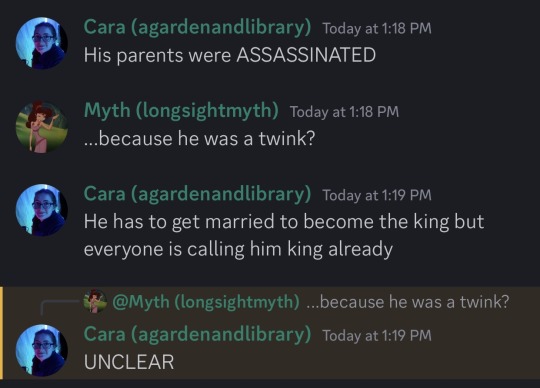
Hey it's not me for once!
26 notes
·
View notes
Text
actually i changed my mind i'm inflicting my tags upon all of you
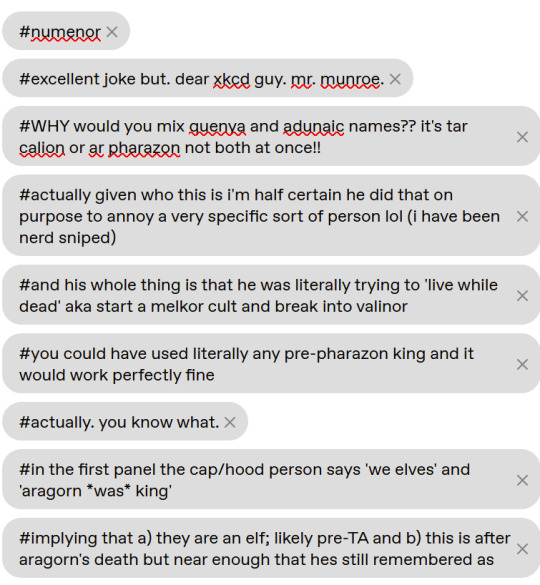
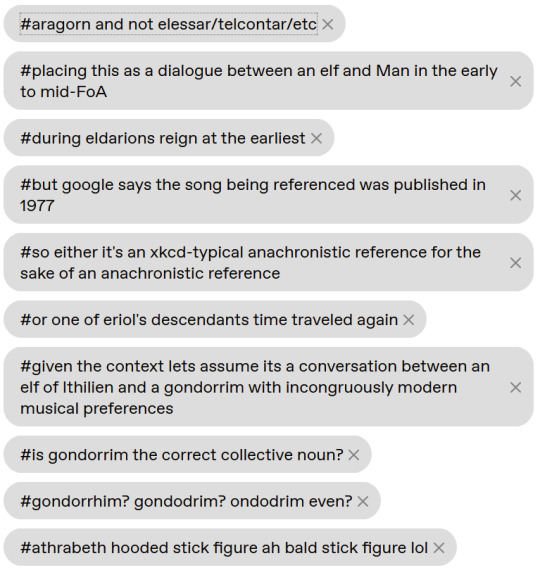

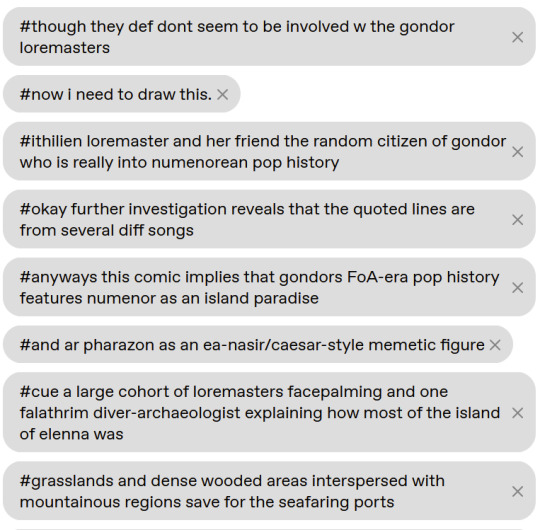
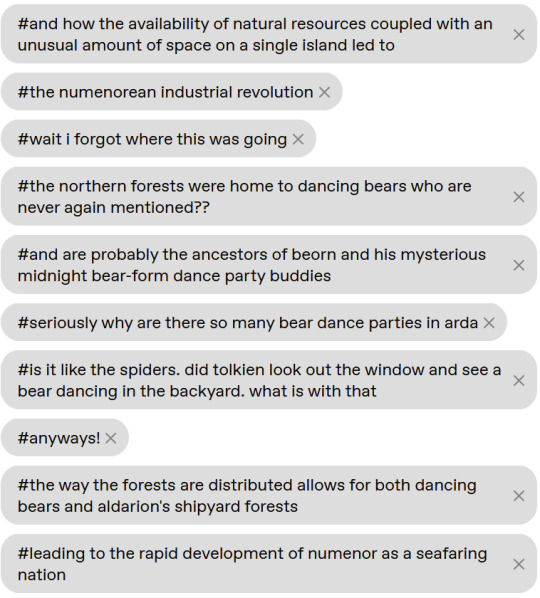
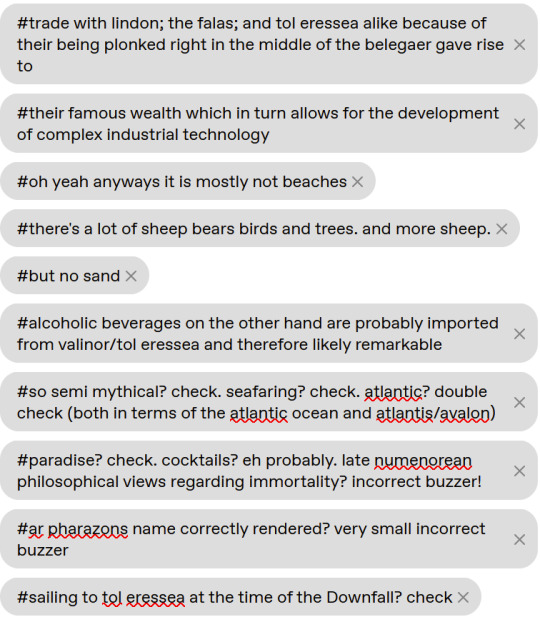
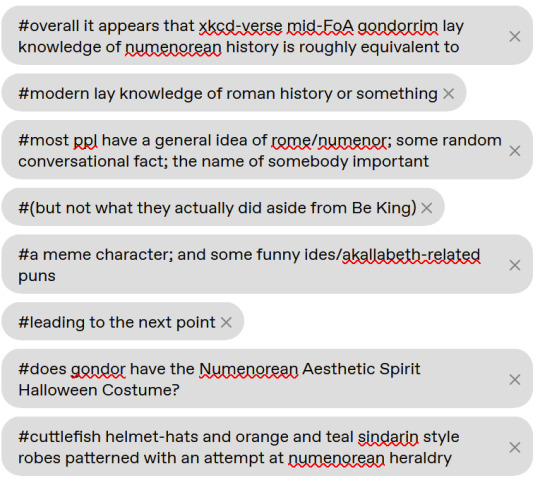
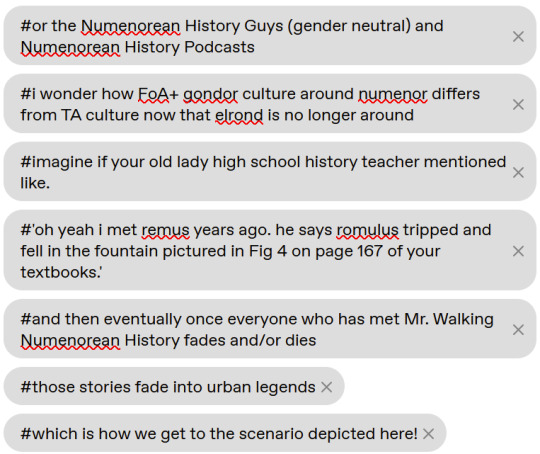

Damn good XKCD today if you haven’t seen it, lads.
#numenor#sorry for the giant tag bubbles there are too many to save and screenshot like normal#WHY would you mix quenya and adunaic names?? it's tar calion or ar pharazon not both at once!!#actually given who this is i'm half certain he did that on purpose to annoy a very specific sort of person lol (i have been nerd sniped)#and his whole thing is that he was literally trying to 'live while dead' aka start a melkor cult and break into valinor#you could have used literally any pre-pharazon king and it would work perfectly fine#actually. you know what.#in the first panel the cap/hood person says 'we elves' and 'aragorn *was* king'#implying that a) they are an elf; likely pre-TA and b) this is after aragorn's death but near enough that hes still remembered as#aragorn and not elessar/telcontar/etc#placing this as a dialogue between an elf and Man in the early to mid-FoA#during eldarions reign at the earliest#but google says the song being referenced was published in 1977#so either it's an xkcd-typical anachronistic reference for the sake of an anachronistic reference#or one of eriol's descendants time traveled again#given the context lets assume its a conversation between an elf of Ithilien and a gondorrim with incongruously modern musical preferences#is gondorrim the correct collective noun?#gondorrhim? gondodrim? ondodrim even?#athrabeth hooded stick figure ah bald stick figure lol#the cap character is probably some sort of loremaster?#and the other figure is... not#the confusion around ar pharazon's correct title and details of his philosophy can be attributed to said figure being separated by 4000+ yr#granted ar pharazon is probably covered in a reasonable amount of detail in gondors history classes but i only recognize the names of#a handful of influential roman figures. let alone the philosophical/moral stances of kings in 2000+BCE#however despite this#the fifth panel is much closer to a representation of the attempted invasion of valinor#overall the bald stick figure seems to have a reasonable understanding of numenorean history for someone 4000 years later with no wikipedia#though they def dont seem to be involved w the gondor loremasters#now i need to draw this.#ithilien loremaster and her friend the random citizen of gondor who is really into numenorean pop history
511 notes
·
View notes
Text
This post about Boromir’s emotional repression made me think about Faramir, and how he copes with the same trauma.
Both of them fought in that battle. They were holding off the enemy until the bridge of Osgiliath could be destroyed, and then they had to escape by swimming across the river. Only FOUR men made it across, including Faramir and Boromir.
The battle is described at the Council of Elrond, but it’s important context for something that happens MUCH later, which is Denethor’s decision to send Faramir back to Osgiliath.
Now, I’ve defended Denethor for doing this. I think it was correct strategy. I think Faramir saved Minas Tirith by delaying the enemy, buying time for Rohan to arrive.
But I don’t blame Faramir for being reluctant, and for losing his cool with Denethor. His father is asking him to go back and do a rerun of a horrific battle that Faramir barely survived, which was basically a massacre for Gondor’s forces. The Witch King is going to be there again. And Gondor is going to be hugely outnumbered.
Faramir is only human. Going back to Osgiliath is traumatic for him.
To be clear, Faramir opposes the mission because he thinks it’s the wrong course of action, not because he’s scared. All the other captains agree with him. He’s concerned for the lives of his soldiers as much as for his own. But he definitely feels inadequate compared to Boromir, and he isn’t perfectly stoic when he responds to Denethor: “Since you are robbed of Boromir, I will go and do what I can in his stead—if you command it.”
He’s being ordered back to the front just one day after his encounter with the Nazgûl, and it’s possible that he’s already been infected with the Black Breath at this point. Pippin describes his face after that experience: “It was the face of one who had been assailed by a great fear or anguish, but has mastered it and now is quiet.” So Faramir is good at repressing his feelings when he needs to, but he’s repressing a lot, and he’s hitting his limit.
I think this quote is so emblematic of how the narrative treats Faramir: Tolkien loves drawing our attention to his suffering, while he’s less indulgent with Boromir. Faramir is something of a self-insert, so that might explain why Tolkien woobifies him at times.
But aside from that, the two brothers also just have different personalities. Faramir is a LOT more talkative and emotional than Boromir! He tells his entire life philosophy to a complete stranger. He isn’t afraid to start drama with Denethor. He’s open to falling in love even though he thinks the world is about to end, while Eowyn can’t bring herself to return his feelings until the war is over. He’s always talking about his heart and dreams and intuitions. He hates repressing his feelings, while Boromir seems resigned to it.
It really makes me wish that Tolkien had given us some scenes of them interacting…
106 notes
·
View notes
Text
Mundane facts character-building challenge!
Thank you so much for originating this idea and for tagging me, @ridingforrohan! I've been on vacation this week and haven't had time to sit down and write properly, but I've been really enjoying using the these sorts of headcanon and ask games as a way to more intentionally think about the characters I write for. Since I'm currently trying to get deep into Faramir's head for my WIP and for some of the sensory asks, I'll do him for this challenge.
1.) If your character had a go-to coffee order, what would it be? In the context of the setting their story takes place in, do they have a go-to morning drink? I don't think Faramir is a coffee (or even a tea) drinker, at least not consistently. If he can resist the temptation of the ring, he can also resist caffeine addiction; indeed, I think he wouldn't like to be dependent on any substance to bring him to full alertness and readiness in the morning (couldn't be me). Besides, I think he is semi-canonically a morning person, based on Sam and Frodo's interactions with him at Henneth Annûn, so I doubt he needs the energy boost anyways. I also imagine him as being rather practical and sparing, so with all of that said, I think he probably starts his day with a full, cold glass of water for the health and hydration benefits. If he had to choose a non-water beverage, for some reason I think he'd be into a V8-type vegetable or tomato juice on occasion; he says its because its full of vitamins, but I think he also just likes that it's very flavorful and a little bit different than the norm.
2.) Do they have a hair and skincare routine? If so are they consistent about it? I imagine Faramir does just the basics, but does them well so that he is always neatly groomed (at least, when his circumstances allow for it). He doesn't give much thought to his appearance beyond wanting to feel clean and put together; and indeed his grooming habits are first and foremost for his own comfort, rather than to impress anyone else. He washes his face morning and evening (when circumstances allow) and combs his hair at the same time. Given his Númenorian background, he never really grows much facial hair, but I imagine he'd neatly shave any stubble that does happen to grow. I think he is very consistent about all of this, as he is about most things.
3.) Does your character have a hobby or pastime?
Well, we know he loves to read and study. When he has the time for it, I think he enjoys reading obscure history texts, especially biographies of leaders he admires in Gondor and Númenor's past. He also reads a fair bit about military history, but not from a love of warfare or glory; rather from an abiding interest in tactics and strategy, and how he can learn from the past. I also think he enjoys poetry, particularly epic poems, and he memorizes portions of the lays that tell the history of the First Age. He recites them seldom, as he is not really one for performance, but a select few (Éowyn, on occasion; perhaps Beregond, and Boromir while he lived) have been able to cajole him into doing so (Éowyn secretly finds this habit of his very endearing, given the tradition of oral history among the Rohirrim). I also think Faramir is someone who takes pride in knowing nautral history (I've written about this in a previous headcanon ask); I think he knows the identities of most flora and fauna in Ithilien, and in the Fourth Age, I think he enjoys caring for the gardens of Emyn Arnen alongside Éowyn. Finally, I think he is one who prides himself on practical knowledge and self-sufficiency, and so despite his high station, I think he has picked up bits of trades such as mending, equipment repair, the care of horses, etc. He likes being able to apply these skills if he ever finds himself in need of them in the field; and he also takes pride in knowing how things are done. Alright, I think that's where I'm going to cut myself off for now, though I could keep going. Once more, thank you so much for the tag!! I will tag @frodosrings, @eodred, @dilettantefeminist, @hobbitwrangler, and @hobbitinnumenor (no pressure tags, if this interests you!)
#lotr#lotr headcanons#tag game#faramir#faramir headcanons#my mutuals have really been rocking it#in helping me get deep into Faramir's mindset#thank you!!
22 notes
·
View notes
Text
Tengwar mode for Adûnaic + later Númenorean writing style HC
More @numenorweek stuff, not directly related to the prompts but somewhat related to the anti-Elf sentiments, so Day 5 it is.
I couldn't find any official mode for Adûnaic, so I figured the consonants out on my own + added some less canon-compliant elements around the vowels.
It's read bottom-to-top: the vowel is either above preceding consonant (typically) or below the next consonant (initial vowel of a word or word-part).
Black: initial writing (Tengwar-based). Red: later writing style.

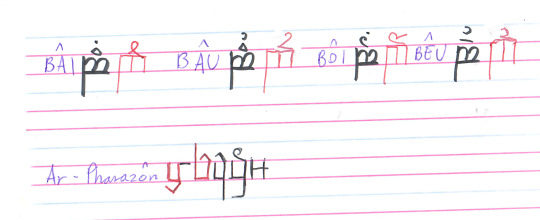
The mapping of sounds to Tengwar is pretty obvious. The un-obvious parts, where I had to make some decisions are:
anca as the letter for "kh": from what I understand it's a voiced h, so it fits with h and the "voiced is doubled unvoiced" scheme that kind of exists, especially in Sindarin and English modes.
vala used for "v/w" (Adûnaic seems to use those sounds for the same letter, depending on context): it fits better with the fact that we already have a lot of t, p and k columns, but no letters from the q column.
ngoldo instead of anga for "ng": anga works better for "g" here
romen used instead of óre for "r": I already needed lambe, so it seemed more natural to me to have more letters from that row. Also, romen is the trilled "r", I think it fits better.
Now the non-obvious and headcanon-y part: I want the vowels to go both under and over the consonants, unlike normal Tengwar. Why? Because I hate the vowel carrier and I want word parts like "ar" and some prefixes/suffixes to stick together. I want words to keep their structure in their orthography.
Same for the diphthongs and long vowels: I hate the carrier and the fake vowels that are really consonants. I want the diphthongs and longs to be normal markers. So, first they used two vowels one over another and then it simplified. And the long vowels are stylized normal vowels.
Also, this approach to the vowels, when all the main letters that we write are actual real consonants, seems in my opinion more fitting to a Semitic-like language that does grammar by changing the vowels and sort of moving them around.
Also I made the below-consonant vowel markers slightly different, to make it more symmetrical, because I like how it works.
And i think that in time the writing style would change, especially after Tar-Atanamir, when Númenor had less contact with the Elves. They would still use Tengwar-based writing system, because it's just so good, but they would make it more of their own. It's more angular, because it seems fitting to me.
Also, I want the vowels to be joined to consonants, because this helps me to HC answers for "why did not they invent the movable type at any point, seriously????". Yes, this is a problem I have.
And yes, adding an "e" below the consonant can be tricky and make it look like some different consonant if you're not careful.
The Faithful preferred to use the normal Tengwar in their private writings, and so later Gondor used this writing style.
#numenorweek#numenorweek2025#silm#silmarillion#Tolkien legendarium#the silmarillion#the silm#Tolkien languages#numenor#adunaic#tengwar
20 notes
·
View notes
Note
Been scouring your blog to see if you have a specific take and i only managed to find the post where you said you are more for people coming up with their own meaning for Tolkiens work. anyhow, after reading you boromir post on how hope is his poison I am super curious as to what meaning you personally ascribe to it all. A lot of scholars will tout hope over despair as the ultimate meaning here (and the ultimate meaning of real life...ugh) and considering your very gut wrenching but meaningful takes on boromir i was just curious. Your thought process is fascinating from a scholarly viewpoint (which is not my strong suit) but also an artistic, emotional, philosophical, and human viewpoint. Whew sorry this ask is so long and disorganized! Have i mentioned I am not a scholar? :D
First off I love this ask it made me so happy to read I had to do so like five times before I felt qualified to answer it and then I spent like months writing this response which is over 4000 words now if you want to know. And, on that note, dw about scholarliness or whatever this ask has more desire to engage with lotr in nuanced ways than most tolkien scholars achie- (gets hit by a piano) anyway~!
It's also just extremely flattering that you're curious of my personal opinion at all so thank you so very much!
(this is the post anon is talking about for context)
As with all things, my answer has many layers. At the most basic and applicable level, and when taking only my Gondorian/Stewardship investment into account, I am engaging with the story for personal catharsis.
The fact that Gondor felt hopeless, that the enemy was merciless and invincible, that even those figures who were supposed to help had only judgement and platitudes to offer until it personally benefitted them, that Boromir and Denethor were isolated and generally condemned and that many only showed them pity after their deaths, feels extremely cathartically familiar to me and my story with chronic illness. I've spoken about this before here and there, but that is the kind of simplistic, energy giving, 'he's me fr fr' comparison that brings me uncomplicated comfort and inspiration.
But that is definitely not 'what lord of the rings is about' not even just to me, it's not even just what BOROMIR is about to me, it is an element of the story and worldbuilding that I have isolated and consumed but that still exists within a far larger whole. And that whole is also fascinating and compelling but in a far more esoteric and harder to define way.
BUT before we get into it, I do also feel the need to explain the limitations I percieve within the 'lotr is about hope over despair' narrative since you've brought it up but neither your ask nor the post you mentioned properly explains it and it'll enhance my point later. SO.
As far as my experience has lead me to believe, when people say 'lotr is about hope triumphing over despair' they mean it in a moralising fable kind of way. This is definitely the narrative the films latched onto, like a leech. Good characters have hope, lose it only to reclaim it again, teach others to have hope etc, and that is good of them. Bad characters are despairing and therefore have no hope, and they do evil deeds because of the despair and lack of hope. The Aragorn vs Denethor film paradigm.
But nothing within the books is anywhere near as cut and dry. As I said in the linked post, Boromir gains hope after having none (the hope that he can save Gondor by using the ring) and that is bad, it is something he has to 'pay for' according to the narrative. Meanwhile charmed and blessed Faramir admits that he never had any hope quite a few times, yet he is not punished for it. Theoden also has no hope and is explicitely going to war to die, but his death is not considered evil or selfish by the majority. Saruman is very hopeful, he's hopeful that Sauron can be reasoned with, that if they work together they can make a better world, but he suffers 100 indignities and then is killed by a cannibal! And most of all, Frodo also rarely (if ever) shows any signs of hope, he merely doggedly marches on regardless and in the end even takes the power of the ring for himself, essentially the ultimate evil act of desperation, but that saves the world!
For the record the idea that LotR is a fable-narrative of any kind seems exceedingly erroneous to me, like the idea that we are supposed to glean any universal Good Moral from the tale due to Tolkien's 'emminent wisdom' feels bizarre in and of itself. But at the very least this aspect is more complex, I think we can all agree.
But even more than that (and this is more perspective than narrative analysis I suppose but I think it bears saying), ‘despair is evil’ is a kind of horrible thing to teach! If the villainisation of people driven to desperate actions or anhedonia because of the deep despair they are suffering is what LotR is about then that’s.. awful! That sounds like a bad book and I don't think I'd want to read it. But lets put a pin in the concept of condemning people for despair for now, look out for the pin cus it’ll be coming back later.
FOR NOW lets get back on topic, if I don't think LotR is 'about' hope triumphing over despair, what do I think it's about?
Well. I know what I'm about to do appears highly out of character for me so please remain calm and gird yourself before I say this but; Let us start with hearing what Tolkien had to say on the subject.
I do not think that even Power or Domination is the real centre of my story. It provides the theme of a War, about something dark and threatening enough to seem at that time of supreme importance, but that is mainly 'a setting' for characters to show themselves. The real theme for me is about something much more permanent and difficult: Death and Immortality: the mystery of the love of the world in the hearts of a race 'doomed' to leave and seemingly lose it; the anguish in the hearts of a race 'doomed' not to leave it, until its whole evil-aroused story is complete.
(this quote is actually from a letter to a fan who suggested lotr was an allegory for atomic power and he was pretty mean and dismissive about it in reply, it's kind of funny)
Now I've been a bit glib about this in the past, along the lines of 'tolkien's own opinion on what his book was about changed for every year of his life and by the time all his friends started dying around him it became about death, what a surprise' mainly because, again, we've had enough people caring about Tolkien's opinions to do us for the rest of civilisation. But I've always known this glib comment to be pretty baseless and unconsidered, since death was a major aspect of his life from his earliest childhood and it makes sense for that to have been a large part of his work. And since I am being sincere I will, just this once, take Tolkien's hand instead of ignoring him.
For him, the theme of his book was not power or domination (or the evils of war or hope over despair), it was about death. It was about people trying to deal with the realities of death existing for them, not existing for others, and what love (loving the world) meant in that context.
On it's surface I find this quote kind of clinical in it's first impression. There's a prescriptiveness to it that does not inspire me, which isn't surprising since this came from a letter full of veiled snootiness on his part.
But mostly, as a concept.. it seems pretty distant from what actually happens in the story itself, right? What aspect of death and immortality was the fellowship embodying? Boromir certainly died, but he was not looking for immortality and his death is far more concerned with guilt than the fact that he is dying. Theodred is dead already, but not even his father appears all that bothered about it and it's quickly set aside to focus more on the war. Denethor kills himself but his and Gandalf's last interaction says far more about despair and faith than death.
And then no other main character 'dies' at all, unless you count Gandalf. And the only main immortal character we have (other than Gandalf) is Legolas whom, whilst he does have quotes associated with his immortality, is far more invested in his and Gimli's relationship than anything else. It's no wonder people choose 'war is hell' or 'hope over despair' narratives over 'death' as the main theme for lotr from their perspective.
It also does not satisfyingly link to one of the most compelling aspects of the books as a whole; that of how they are presented. The thread connecting death and immortality to writing a story that is from in-universe historical accounts, editted and compiled by many subsequent in-universe hands, is there but hazy. The intense catholic-ness of the story is also intuitably related to death and immortality, but not explicitly.
In essence, death does not feel like the main theme of the books when you are reading them, at least I don't think most experience them that way.
However, in spite of all that, Tolkien's opinion on what his books are 'about' is still the closest I have seen anyone come to my own. Which I assume is hard enough for you all to hear, but imagine how I feel 😩
To me, LotR is most themactically consistent when viewed through the lense of Frodo and Gandalf's ever misquoted early interaction;
"Behind that there was something else at work, beyond any design of the Ring-maker. I can put it no plainer than by saying that Bilbo was meant to find the Ring, and not by its maker. In which case you also were meant to have it. And that may be an encouraging thought.’ ‘It is not,’ said Frodo. (emphasis mine)
It is not comforting to know that the suffering in front of you was always meant to happen, no matter how comforting the idea of a divine plan might be to some. And that is what Gandalf is offering Frodo in this moment, the relief of a divine plan and its ‘high beauty for ever beyond [the Shadow’s] reach’. But this is never comforting to Frodo in the books, the comfort he finds on his martyr's journey is in Sam. Indeed, it is actually Sam who finds comfort in 'the high beauty', this reminder that beyond all his own suffering there is an imperishable and eternal light that can never be dimmed.
But not Frodo, how can he? His eventual fate is to grasp the power of a weapon so unholy it sickens his soul, to do that which he has been told is irreversible and unforgivable, so that he can never be at ease or even survive in the lands he has loved ever again. The 'High Beauty' is what is doing this to him, what made the rules, what meant for this to happen, what he is doing this in service of. And Gandalf, whose soul will be present to see the very end of this tale, cannot possibly understand what it is for your whole life to be encapsulated by just your own small painful part of what Gandalf would propose was a beautiful and universal tapestry.
And lack of agency against the divine plan is precisely the narrative thread that ties every character together. To some it is a comfort, Aragorn and Gandalf and Sam are all gladdened and encouraged by the knowledge that there is some higher power ordering their lives, some greater beauty they are all a part of beyond any earthly pain or suffering. They are not in control and to remember this is a relief. It inspires them to better fulfill their ordained duties and drive themselves through terrible trials.
To others it is no comfort at all, Boromir and Frodo have no faith in the prospect that the divine plan will include success or happy lives for them at the end of their tasks. But it is a hopelessness and uncertainly that they both accept. They simply believe their duties must be attempted anyway, hopeless or not, even if it makes no difference to the outcome in the end. Lack of control is just a reality they live with.
And to some it is a horror. Denethor and Eowyn want to fulfill their duties, but these duties are torture. They demand loved ones die, they demand relentless fear and sacrifice, they demand ceaseless and hopeless toil. And in the end both of them are given rebellious breaks from these duties by the narrative, ones that are horrifying in and of themselves (and portrayed as wrong to one degree or another) but that are still extremely cathartically presented as attempts to reclaim control of their lives away from a callous divine. Even if, ultimately, this also was out of their control.
Merry, Pippin, Legolas and Gimli appear to have never quite had to confront the realities of their powerlessness before. But through the story they become intimately aware of it in ways that force them to make choices they are not ready to make. For Merry and Pippin, this leads them to ultimately empathise with Eowyn and Denethor’s positions, wracked with guilt and equally horrified, attempting to find agency in death where (it appears) none can be found. For Legolas and Gimli, they confront the spectors of lack of agency/death for the first time in the narrative (sea-longing and the Paths of the Dead) and are irrevocably changed by them, eventually leading them both to attempt to circumvent their fates by illegally sailing to the uttermost west. Obviously fandom likes to believe they made it and live happily, but narratively it is also suggested that they died at sea in the attempt.
Now, at the risk of indulging in my ever-derided biographical criticism, I do think that all of these characterful arcs are represented in Tolkien’s own life. I feel comfortable saying that Tolkien was not a happy man by default. He was wracked with guilt from a very young age (wow a catholic with guilt, groundbreaking) but that guilt followed him and found new reasons to manifest until the very end of his life. And a lot of this guilt had to do with death, his father's death, his mother's death, his friend's deaths. And a lot of it had to do with fear of leaving unfinished or poorly finished business behind him at the time of his own death: guilt about how he had taught his students, about his scholarly work, his parenting skills, his so-oft-mentioned faith.
And being a man of faith, he would have experienced all these things as a part of the divine plan, even as they were also his guilt to bear. So, clearly, Tolkien's experience encompassed all of these characters, right? The despair and the torment and combined love-of and frustration-with the divine. The failure. He knew them all. And within all of them, as well as within the narrative and world itself, there is a wrestling, there is an ever-shifting complexity and multitude of different opinions to how one experiences a life that hurts in a beautiful world that you love but that you eventually must leave, with the sensation that you have no control over any of it.
However, a complication to any declaration of ‘what LotR is about’ is that it is a self-admittedly unreliable narrative. If you cannot necessarily believe everything the narrative is telling you, then suddenly additional layers of complexity come into play in determining the meaning within an already complex text. In LotR you can actually track which characters are recounting which parts of the story to Frodo or Sam at the time of writing. But it is also just obscured enough to make it ambiguous and to enforce the idea that this is a version of this original story edited and compiled for many generations after it's writing.
So not only are these characters and events transient, uncertain and being (sometimes bluntly) misrepresented by the narrators, YOU are now complicit in that. You are yet another interpreter to alter this narrative through your perspective, just as all works and all lives are interpreted by those who view them, with no way to control that judgment. You are also a character now, making it even more difficult to make definitive judgments about a question like 'what LotR is about'.
The clearest example of how this narrative unreliability and reader interpretation comes into play within the text itself is when Frodo describes the fellowship's entrance into Lothlorien to Faramir. He is being blindfolded in order to be lead to Henneth Annun, and he recounts;
‘As you will,’ said Frodo. ‘Even the Elves do likewise at need, and blindfolded we crossed the borders of fair Lothlorien. Gimli the dwarf took it ill, but the hobbits endured it.’
But we, as readers of the previous book, know this is a gross mischaracterisation of Gimli. He did not take issue with being blindfolded, he took issue with being singled out as the only member of the fellowship who needed to be blindfolded.
‘As was agreed, I shall here blindfold the eyes of Gimli the Dwarf. The others may walk free for a while, until we come nearer to our dwellings, down in Egladil, in the Angle between the waters.’ This was not at all to the liking of Gimli. ‘The agreement was made without my consent,’ he said. ‘I will not walk blindfold, like a beggar or a prisoner. And I am no spy. My folk have never had dealings with any of the servants of the Enemy. Neither have we done harm to the Elves. I am no more likely to betray you than Legolas, or any other of my companions.’
In this one moment Frodo has taken what was a reaction of justified indignation against racial prejudice, and made it sound like a minor tantrum over a shared burden. He has also used it to further aggrandise his own people in Faramir's eyes. And it is up to YOU to notice this, to review it in your mind, to choose what it leads you to believe about all characters involved. The narrative certainly never helps you, or addresses it ever again. You have to wrestle with what it means in your mind.
I believe this is the reason I have observed that every person who reads LotR and loves it and keeps rereading it feels like they are excavating something. There is a narrative under the narrative for every new pair of eyes on the tale. And that narrative is you, it's who your experiences and sympathies lead you to listen too harder, it's the story of the experiences you understand. And in that excavation, you are also reclaiming a moment of control for yourself in conversation with the story and whatever you have chosen to excavate. One might say these are all aspects of every story, but LotR is unique in its investment and immersion into the concept.
Because, to me, when Tolkien says his story is about 'death and immortality', what I read is that it's about the ultimate lack of control we have (death) and trying to empathise and accept the unfairness of what will become our inherently false legacies (immortality). And then just the vast spectrum of experiences and emotions those things conjure. It's not just about those things, it is an attempted soothing of those fears and struggles, it is an offer of comfort or catharsis or applicability. It is also an acknowledgement of the love that drives you and that you will eventually grieve.
Frodo leaves the shire to save it because he loves it, but he knows the entire time he will never be able to fully return. He is frustrated, it hurts, but a piece of the Shire in Sam comes with him and whilst it cannot save him, Frodo is still comforted.
Sam leaves the Shire because he loves Frodo, and he loves the high beauty as embodied by elves and magic and history. He also knows implicitly that this is a task he cannot refuse, but these things comfort him. He is glad to be guided and strengthened to even greater feats the more he trusts in a higher power, but he has a life and a family in the end. And if that is what the Higher Beauty decrees for him, where it has doomed Frodo to incurable soulful wounds, are we surprised at either of their choices? Can we blame anyone for their hope OR despair in the face of powerlessness? Oh! Look at that! It’s that pin I mentioned quite literally last century ago. TOLD you it’d be back.
And that brings us back to the question, what do I think LotR is about.
We are all powerless in the face of death and in writing a book about death Tolkien’s work has an inherent universal applicability in this regard. Tolkien asks an unconscious question within lotr, how should we cope with being creatures that love the world but that are doomed to die and leave it? And then he leaves that question entirely unanswered. This is what sets lotr apart and truly creates a story in which people can read narratives therein that appear entirely separate from death or any other recognisable theme others might see, without losing the sense of universal appeal. He offers multiple perspectives, including that of the dominant religion’s prescriptive decrees of right and wrong, but there is no solution brought forth in the story that saves anyone from grief or death or regret in the end. Not even Aragorn or Arwen, who are in essence the most holy and faithful characters barring Gandalf within the story, end without heartbreak and despair!
‘‘I speak no comfort to you, for there is no comfort for such pain within the circles of the world. The uttermost choice is before you: to repent and go to the Havens and bear away into the West the memory of our days together that shall there be evergreen but never more than memory; or else to abide the Doom of Men.’’ ‘‘Nay, dear lord,’’ she said, ‘‘that choice is long over. There is now no ship that would bear me hence, and I must indeed abide the Doom of Men, whether I will or I nill: the loss and the silence. But I say to you, King of the Numenoreans, not till now have I understood the tale of your people and their fall. As wicked fools I scorned them, but I pity them at last. For if this is indeed, as the Eldar say, the gift of the One to Men, it is bitter to receive.’’ ‘‘So it seems,’’ he said.
There is no such comfort!! … Or is there?
To me, the appeal of Boromir is in the solution he offers; the comfort is in the wrestling!
Aragorn and Arwen did absolutely everything they were supposed to do, unquestioningly, to the point that Aragorn goes to the Silent Street and just lies down to die because it’s ‘the right time’ and he mustn’t become ‘unmanned and witless’. And then he dies and he makes a beautiful holy corpse that cannot comfort Arwen or his children or his people for even a moment.
But Boromir dies with a smile. Aragorn promises that Minas Tirith will not fall, and that does comfort him, because that was the wrestling he chose, the love he decided to hold, the meaning he decided to find and fight for beyond all his powerlessness to protect it. So that’s the answer I find and it might be different from yours, but it’s in LotR to be read because the story is about the wrestling as much as (if not more than) it is about the end. The road DOES go ever on and on, after all!
So ye das wat lotr was about I fink thanks 4 askin 👍I REALLY hope it makes sense. I also really hope Anon manages to see it after it took so goddamn long to respond 😂
129 notes
·
View notes
Text
BOROMIR WEEK 2025 - DAY 1
Prompt: Protector and Teacher
Title: A Fine Young Man
Rating:Teen and Up Audiences
CW: mature themes (talk of d*ath and similar topics, hence the Teen and Up Audiences rating. But I do not think it's excessive).
Characters: Boromir (obviously!) and Elbarad (OC; he is included in my Reunited Kingdom OC profiles).
All of my OC profiles and additional details concerning my AUs can be found on my Tumblr Masterlist, which also happens to be my pinned post.
Synopsis: Boromir and his Captain's young son engage in a deep, heartfelt conversation about insecurities, love and other matters.
**IT REFERENCES CHARACTERS AND EVENTS WHICH WILL TAKE PLACE IN MY MAIN WIP**
**Read at your own risk**
Beginning Notes: I will not be giving too much away as I think most of what needs to be said is explained within the context of the story.
This one-shot references characters and events which will take place in the rewrite of my—by now discontinued—WIP The Lady of Ithilien. While that story followed Tolkien's canon more closely, the rewrite is/will be, among other things, a Boromir Lives! AU.
In the rewrite (which is currently being planned and still does not have an official title), it is implied that Boromir survived Amon Hen as he shows up to Aragorn's coronation with rest of the Fellowship.
He is on that occasion created Lord of Osgiliath and it is also at the coronation that he meets his future wife Idhrildin, daughter of Idhrion, the Lord of Anórien. They are both OCs and, while I do not have a a faceclaim for her dad yet, I certainly do have one for Boromir's lovely wife. She is included in my Reunited Kingdom OC profiles and, before long, her dad will be as well.
Idhrildin is also related to Forlong the Fat of Lossarnach (in my AU, Forlong has a sister—another OC of mine, which will probably not appear in any of my writing unless I specifically write a one-shot about her) and Idhrildin is her daughter. So you could say that Boromir found himself an extremely well-connected wife, but that is most certainly not why he married her. Boromir married for love and Idhrildin also fell in love with him. She possibly had a crush on him before they even met. It is my headcanon that many women—both ladies and commoners alike—had their eye on the Captain of the White Tower. Who's surprised? I most certainly am not.
Based on my current headcanons (they constantly change and I have the bad habit of coming up with different and new ideas nearly every day), Boromir and Idhrildin marry in the year 3020 of the Third Age. Following his father-in-law's death and following the the birth of his first child (the two events occur in the span of just a few weeks), Boromir is officially created Prince of Anórien as a sign of gratitude for his long service in the defense of Gondor. He is essentially given a promotion and Idhrildin's status is also further elevated. She is her father's only heir so...I thought it appropriate. Also, the people of Anórien and Gondor probably asked for it. They demanded it.
Faramir is canonically created Prince of Ithilien and is Lord of Emyn Arnen and I think it's fair that Boromir also gets to call himself a prince and lord of a city that clearly matters a lot to him. Since he is a prince he also has his own personal guard; his own Company. Aragorn aka King Elessar has his Grey Company, Faramir has his White Company and Boromir's company is...the Silver Company. It's official symbol is, of course, a Silver Trumpet. I was sort of thinking of including the Broken Horn of Gondor as part of the heraldry, but since Boromir never died...it probably doesn't make much sense. I will have to think about it. As of now, the official symbol is the Silver Trumpet. I got the idea specifically from this scene from FOTR.
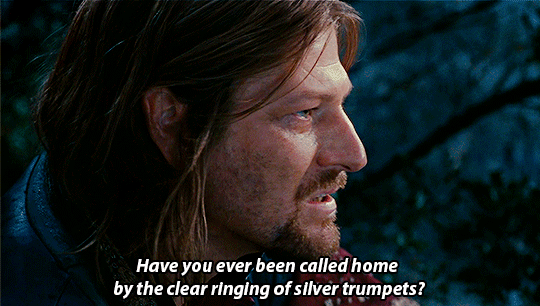
It's one of my favorite scenes from the first movie so...I think it's fitting.
Elbarad, the young boy featured in this story, is the teenage son of the Captain of the Silver Company and, as you will find out, he has his own demons and issues to deal with. My Gondor is...very problematic.
AO3 LINK
End notes: I hope you liked it! I hope it was a pleasant read and I can't wait to know your thoughts about it! Thank you for reading!
Original character faceclaims:

Callum Wharry (Tommen Baratheon in the first two seasons of the TV show Game of Thrones) as Elbarad.
All of Elbarad's faceclaims
This photoset, as well as many others, can be found in my Reunited Kingdom OC profiles (as mentioned in the beginning notes, check my Masterlist!)
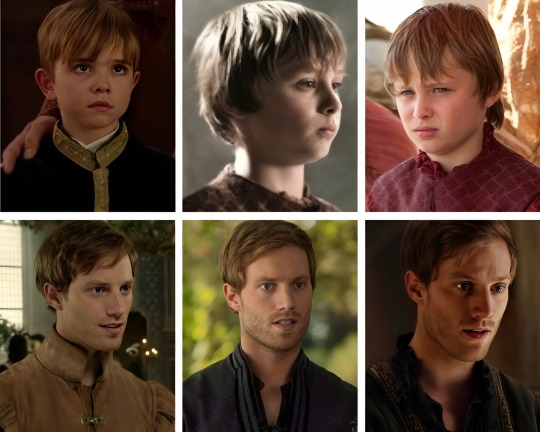
Dominic Ricci (childhood), Callum Wharry (pre-teen and teenage years); Jonathan Keltz (late teenage years and adulthood)
That's all from me for today!
Thank you for reading!
Tags: @boromir-week, @lucifers-legions, @emmanuellececchi, @eodred, @saurongorthaur9, @fictionalmenjusthitdifferent and anyone else who may be interested in reading!
[If you want to be tagged, please let me know and I'll add you!]
#boromir week#boromir week 2025#boromir#ch: boromir son of denethor#boromir in the fourth age#boromir lives au#oc: elbarad#reunited kingdom ocs#boromir week day 1#prompt: protector and teacher#author: annabthesolitarywriter#author: me#formerly annabawritersdream#formerly annab99awritersdream#oc fancasts#oc photosets
18 notes
·
View notes
Text
My unsorted, rambling thoughts on The Lord of the Rings, Appendix A, I The Numenorean Kings, (i) Numenor
Okay, we're getting a short version of the Silmarillion. Very condensed. Whoever would read that without knowing for example what the Two Trees are must be so confused!
Fëanor thought to restore the Silmarilli from Morgoth by force. As opposed to what!? They were recovered by force in the end, just not by Fëanor. This sounds way to judgamental.
Interesting how it keeps saying they waged war against Thangorodrim, not Morgoth. Don't underestimate Sauron's part!
In Elrond and Elors alone the line of the heroic chieftains of the Edain was preserved, and after the fall of Gil-Galad also the lineage of the high-elven kings. I guess we are talking about pretty specific chieftains here as I assume many of them had more than one child. Also isn't this ignoring Galadriel?
Okay, so at the end of the first age the half elves were given the choice, and only then Elrond was given the grace to sail in the end. No answers about Elured and Elurin again, but something to think about.
It specifically says again that Elronds children get the same choice. Why not Elros' children? In the context it sounds as if it was done this way mostly to make poor Elrond even more miserable.
I hate how he keeps talking about "lesser" men.
Elros was granted a lifespan many times that of lesser men, the other Numenoreans three times that of lesser men. That's nice, I always worried that the long lifespan came mostly from Elros' descendants spreading his genes exponentially, but apparently they didn't all die on him basically immediately, either. I still believe that 90% of the people in Numenor were descendants of Elros by the time it sank, though. It's either that or a lot of incest.
From Numenor they could see the white tower on Tol Eressëa. Given that the earth is still flat at this point in time, the limit should be their eyesight, not the horizon, though, so I'm assuming they could also see the forbidding line of mountains once raised to defend the blessed land from Morgoth though. What a sight.
Why does Tar Atanamir get the cognomen The Great? I need to pay attention if there's more information on him.
The Numenoreans grew in wisdom and joy. Now thinking what "growing in joy" means. They laughed more? Probably just generally improved standards of living. They did start in a war in which they were "utterly defeated".
Was Tar-Minastir the one who helped fight in Eregion? It only says that he sent a great force to help Gil-Galad, not what for.
So they abandoned the eldarin tongue, meaning they spoke it regularly before, but there was a Numenorean tongue, too, different enough that I assume they spoke that every day. Was the Eldarin tongue used only in formal context? Or as a second language that people spoke when not at home?
Interesting, Sauron's servants deserted him when they saw the splendour and might of Ar-Pharazon's army. I mean, they probably weren't very loyal to begin with, but what drove them now?
"But great kings take what is their right." [Sauron] said
Elendil and his people escaped with nine ships, seven palantiri and a baby tree. Nice. Though people that fit on nine ships? Absolutely everyone in Gondor must be a direct descendant of Elendil by the time of LOTR, come on.
How did the population of nine ships in less than three lifetimes of men establish two enormous realms? Sauron's servants must have run away quite far.
Sauron lost his body that "he had long walked in"! He fled as a spirit of hatred on a dark wind. He also couldn't look pretty anymore, and his power was only through terror from this point forward, which must have been hard, as before it was way more through deception and talking, like Saruman's.
Mount Doom has an elvish name! Amon Amarth (Mount Doom). I did not know that.
12 notes
·
View notes
Text
ROTK Re-read: Book 5, Chs 1-5: I'm Always Thinking About Eowyn
Ch 1 - MINAS TIRITH
"we shall have great need of folk of courtesy in the days to come" love that Pippin is also going places because he too has empathy and courtesy - he understands that the way to Denethor's heart is to recognise Boromir's sacrifice by pledging his own life to the service of Gondor, even though everyone in the room fully expects him to be useless.
"oath breaking with vengeance" hmm hmm but Aragorn does not do this! Aragorn offers a literal second chance to the Dead!
this chapter is reminding me what a noble tragic figure Book! Denethor is compared to his perception in popular culture. it's also a brilliant bit of scene-setting for the big battles ahead, as Tolkien whisks Pippin (and us) from top to bottom of the Tower of Guard, getting to know people at all ranks of society!
Ch 2 - THE PASSING OF THE GREY COMPANY
"he is not so mighty that he is beyond fear" and no one ever is are they
okay so this is THE Eowyn chapter and I have such a lot to say, let's start by noting that Eowyn begs Aragorn not to go to the paths of the dead under the guise of giving him sound military advice - the fact that she cloaks her feelings in military tactics is so great
anyway I love this conversation between her and Aragorn so dearly, it's so complex and it's ALL ABOUT gender roles and sexism? like he tries to set the tone up front by being like, look, if you weren't staying some bloke would be, I'm not saying stay home because you're a woman. and she claps back with, if it isn't sexism why am I ALWAY the one chosen to stay home. and of course she is right.
but he continues to See her! he sees that she wants glory and he tries to talk her out of it, but she comes back with this supremely medieval rejoinder: I'm a member of the warrior class, not a serving-woman - she's insisting on her rights, not based on the equality of the sexes so much as her high status as a lady. it's just so well written because Tolkien captures both an everlasting feminine mood (treat me like a person!) AND makes sure she expresses it in a way that's authentic to her cultural context (medieval style classism). histfic goals honestly.
and it's quite lovely that Aragorn spends the whole conversation gently insisting that he doesn't think she's less because she's a woman - what he fails to address is that thirst she has for glory in death. her contention is "since we're all going to die, why throw your life away on an inglorious death?" and his contention is "since we still have a chance of surviving, why throw YOUR life away in a battle we're all begging you to stay home from?" like the fundamental disconnect here is her despair. "fear is the mind-killer" is a huge theme of this book
and this is THE thing I think most of the fandom, perhaps thanks to the movies, doesn't understand about this character: which is that she's like Denethor right now, she's lost all hope and only wants to die in the way that seems good to her. Eowyn is not a spunky girl power figure, fighting for a woman's right to do battle! she's going because she wants what she conceives to be a noble death. like, the fandom usually types her as an ISFP, all High Ideals and Chafing Against Social Constraints, but I don't think she is? she reads to me far more as a brittle INTJ (or even, as @eomira argued, an unhealthy INFJ) - she isn't driven by a moral crusade but by a complete cold certainty of death, which actually leads her to act in some very amoral ways.
anyway the funny thing about all this is that it's serving a specific literary purpose: we've had Gandalf and Frodo going through a death-and-resurrection motif, with people left behind to mourn them. and that's what Eowyn is, literarily, for Aragorn - she's the one who is left to mourn him when he takes the paths of the dead. except that Tolkien takes Eowyn so seriously as a person, even when using her for this literary purpose, that he gives her her own motivations that are so much more complicated than "oh this woman Aragorn has known for five minutes has fallen MADLY IN LOVE with him". because she hasn't.
anyway we're off on the paths of the dead and once again Tolkien chooses the shortest/humblest person as the audience viewpoint character.
Ch 3 - THE MUSTER OF ROHAN
ok but it means so much to me, and is very healing actually, that NOBODY thinks any less of Éowyn for caring very much about Aragorn and obviously grieving for him. nobody's telling her she should feel ashamed for not being able to control her feelings or trying to get a man that doesn't belong to her. they're just like "oh yeah, big mood, let's try to cheer you up."
military strategy note: it strikes me just how incredibly risky it is that the riders head off to Gondor while the orcs are already attacking the Eastern border. they really are staking the entire future of their kingdom on the siege of Gondor!!!! like, if they can beat Sauron at Gondor then the orcs attacking Rohan will have to fall back across the river because their supply lines will be threatened. but if they lose in Gondor - or heck, even if they can't force a quick decisive battle - then they'll be stuck miles from home with Rohan wide open to invasion. my goodness it is just the BIGGEST gamble and shows what an INCREDIBLY desperate position they are in and just HOW selfless they are being by going to Gondor's aid. seriously I need to lie down a minute.
Ch 4 - THE SIEGE OF GONDOR
as cinematic as Tolkien is I love that he keeps his magic fairly low key, even when Gandalf is confronting the Ringwraiths themselves!
middle earth's Worst Dad
"let us not forget that a traitor may betray himself and do good that he does not intend" CAN WE GET AN AMEN
"he will not come, save to triumph over me" does Denethor have delusions of grandeur
military tactics win: denethor sends out a sortie to bring in the defenders of Osgiliath, but calls them back before they can join full battle, which is bound to be costly. this isn't abandoning your nice safe siege for a serious stand in the open - it's a limited, strategic attack and retreat. if you're going to do fighting outside walls in a siege, this is a sensible way to do it.
it's interesting how in ROTK Tolkien does a lot of omniscient narration; this makes the book read more like a medieval chronicle than like a novel, and it's a mark of how well he's set up the emotions and the stakes, and how absolutely glorious his language is, that the book remains so immediate and gripping even though we're hearing everything at such a long distance.
the relationship between Denethor and Faramir is so incredibly well written!!! like, Gandalf tells Faramir that his father will remember he loves him ere the end - but Tolkien makes it so clear, even as Denethor mourns his son, how deeply selfish he is in his grief. like, so selfish that he loses all interest in commanding the siege, because what's the point of remaining the lord of a city if he's not going to have descendents to rule after him? feels like Tolkien is walking a fine line here between, yes, Denethor loves his son, but also, yikes, that love is incredibly twisted and unhealthy.
"go now and die in what way seems best to you" not only is this a complete banger of a line, but it draws this extraordinary link between Faramir's father and his future wife. like, do we want to bet that part of Eowyn's attraction for Faramir is the fact that he couldn't save his dad but he can save her?
anyway the end of this chapter is SO FACE MELTINGLY EPIC!!!! you've got this intimate tragedy of Denethor, you've got the massive assault on the city, you've got this climactic confrontation between Gandalf and the Witch-King.
plus tell me if I'm going absolutely crazy but. this cock's-crow moment. does this have anything to do with the cock crowing as the apostle Peter was denying Jesus. like. something something the moment at which the spell of evil breaks.
Ch 5 - THE RIDE OF THE ROHIRRIM
absolutely love the way that Tolkien depicts Ghan-buri-Ghan and the wild men. he doesn't other them the way he does the Haradrim. in fact one of the first things he tells us about them is is that they are craftsmen - and good ones too. which is basically him acknowledging their humanity and dignity. they bring a bit of needed diversity to the world; after the Numenoreans going on about High and Middle and Low men it's a bit of a breath of fresh air to have these lil wild men getting this very sympathetic very heroic portrayal
ha ha ha not Theoden explaining why the Riders are pressing on despite the enemies behind, and he gives exactly the same reason I did in ch 3.
FORTH EORLINGAS *endless screaming *
how does this book never get any less epic
10 notes
·
View notes
Text
A Need of the Soul
Summary: Éomer is teaching Faramir how to speak Rohirric as a surprise for Éowyn. Come for Faramir being a sweet husband, stay for the emotional links to Boromir and Théodred. Oh, and for Éomer being a big horse dork.
Context: I pulled a JRR and wrote a whole story around a special word I like! More on that at the very bottom. You can read this without knowing any of my personal Rohan head canon, but just in case it’s helpful: In my world, Éomer is married to his childhood best friend, Mereliss. My Théodred (who you can read more about here or here if you’re interested) was a nurturing soul with a curious mind, and I may be obsessed with him. And damn it, my Éomer can absolutely read and write! (See here for why that’s the case in my HC.)

As soon as Éowyn left for the morning, Faramir pulled out his secret stack of papers, the ones he had started requesting from Éomer six months ago when he first decided to try learning Rohirric. He wanted to master the language as a surprise for Éowyn, ever conscious of how much she had sacrificed on his behalf when they married. Although he knew she loved Ithilien, he also knew that sometimes she still longed for the familiarity and comfort of home, for the people, places, and culture that were now many miles away. If he could bring some of Rohan to her in the form of her language, he hoped he could brighten her heart on those days when she looked most in need of a reminder of all that she missed.
With this goal in mind, he had thrown himself wholly into the pursuit, but the process was more difficult than he had hoped. The Rohirrim didn’t keep written records in their own language, nor did they have textbooks or primers made to learn from. All Faramir had were the pages that Éomer would write out and send to him every few weeks, using Westron to describe basic grammar rules and listing common Rohirric words and phrases by their definitions and rough pronunciations. Working from written materials to learn a language that was only taught orally was maddeningly difficult, and Faramir spent long hours alone at his desk laboring at the exercises Éomer sent, unsure if he was even getting close to the sounds he was attempting to produce.
At least he would be aided today by the presence of Éomer in person. The king of Rohan was coming to Gondor to take counsel with his allies on military matters, and he had agreed to make time for some lessons while his own wife, Mereliss, kept Éowyn occupied in furtherance of the surprise. With Éowyn gone now to meet her sister-in-law, Faramir looked down his lists of Rohirric words and tried to commit a few more to memory, repeating them slowly out loud to himself while he waited for Éomer.
“If someone back home heard you slur your way through those words like that, they might assume you were a drunkard.”
Faramir looked up to see Éomer smirking at him from the doorway, still dressed in his riding clothes and holding a small pack. “Well, if the performance of the student falls short, I think we have no option but to blame the instructor,” Faramir returned with a smirk of his own.
“A fair point, I will grant you.” Éomer strode in and tossed his things on an empty chair before pulling Faramir up into a strong embrace, thumping a fist on his brother-in-law’s back with enough enthusiasm to knock the breath out of him.
When they separated, Faramir smiled and held up his stack of papers. “I do appreciate all of this. It’s a lot of work for me, but for you, too, I’m sure.”
Éomer gave a dismissive wave. “I have the easy part. Besides, there’s some benefit to me in all of this, as well. I’ll certainly enjoy the show the next time you visit Edoras and all the ladies at court discover that you can actually understand their scandalous comments about how handsome they find you. Your admirer’s club is in for a big shock.”
They both laughed, though Éomer noted the flush of pink in Faramir’s ears and cheeks and that only made him laugh all the harder. “Don’t let them see you blush, you’ll only make it worse!” He plopped down into a chair and put his feet up, smiling.
As Faramir took a seat across from him, he felt a warm, familiar echo in his heart. The easy camaraderie, the good natured teasing balanced with true affection…it couldn’t help but bring Boromir to his mind. Faramir still missed his brother every single day and looked for reminders of him everywhere that he could. But he didn’t think it was a stretch to see clear elements of Boromir reflected in Éomer–in his strength and brashness, his earnest intensity, his fierce loyalty. They were both proud men of action with an unshakeable sense of duty and love for family. Éomer could never replace Boromir, and he was surely his own man, different in many ways from the brother Faramir lost. But it lifted Faramir’s spirits to once again have such a figure in his life.
Now his brother-in-law reached into his pack and pulled out more pages, covered from top to bottom in his own scrawly handwriting. “I’ve brought you some more to learn–words you’d hear often around Rohan and that any self-respecting Rohirrim would know.”
Faramir accepted the papers from him and skimmed his eyes down the first page, but a look of confusion slowly built on his face as he read. ��Am I understanding this correctly? Why do you have twenty different words for ‘horse’?”
“I have not given you twenty words for ‘horse’! Each one of those means something very different.” Éomer grabbed the page back and pointed. “This one here, éotynde, this is an old, calm mare that would be suitable for a young child just learning to ride.” He pointed again. “And this one, éoweder, is a high spirited horse that has quickness and agility but is unpredictable and difficult to control. The others are equally unique. Do you not see?”
Faramir gently extracted the page back from Éomer’s grip, hoping to avoid a further explanation of each specific variant on the list. “I understand those distinctions, but are they really significant enough that I require a whole separate word for each one? We make do in Gondor with but one term. A horse is a horse.”
“A horse is a horse?” Éomer gaped at him, incredulous. “You think the language of the Rohirrim would put a courier horse, whose purpose is swiftness and endurance, in the same category with a farm horse, who sacrifices speed in favor of strength and power? They aren’t remotely the same thing, and a proper language wouldn’t treat them as such. If we went by your rules, we’d all be calling the blacksmith a baker because they both make things with heat!”
It was obvious from the truly scandalized look on his face that Éomer would never concede the point, so Faramir held up his hands in smiling capitulation. And if all these varieties of horse were important to Éomer, likely they would be to Éowyn as well, so Faramir would learn them as best he could. But he desired to speak to Éowyn of many things, and horses were nowhere near the top of the list. He shuffled through the papers one more time. “Have you finally given me anything that would be suitable to say to a beloved wife?”
Éomer shot him a look. “I am not the right person to consult for words of romance. And certainly not when the woman to be romanced is my own sister.”
Faramir laughed. “Fair enough. Let’s get back to your many words for ‘horse’ and I will ask Mereliss to help me with some more emotional thoughts later.”
Éomer sat back, satisfied. “I will have you sounding like a Rohirrim in no time. Now, do you know the word for a horse that likes to cause trouble in the stable with the other horses?”
**********
The next morning, Faramir spent two hours with Mereliss while Éomer and Éowyn went for a ride. When the siblings returned, Éomer sent Éowyn to Mereliss’s quarters and went himself to check on Faramir’s progress. He found his brother-in-law once again at his desk, bent over his work, and dropped casually into a nearby chair.
“Did you get all of the flowery and eloquent phrases you need?”
Faramir put down his pen and smiled. “Mereliss helped me to write a special toast to Éowyn for our upcoming anniversary. I knew what I wanted to say, and Mereliss made sure it will sound not just like a bunch of Westron bluntly converted into Rohirric words but rather something that was written by a native speaker. Something truly of Rohan. She has quite a talent for beautiful language and imagery.” He gave a sly smile. “Though she told me that you also have something of a poet’s heart when the two of you are alone in your own chambers.”
Éomer’s head snapped up, a tinge of dark red sweeping across his cheeks. “She told you what?”
Now it was Faramir’s turn to laugh at his brother-in-law’s furious blushing, so out of character for one who was otherwise always self assured and confident. Faramir had faithfully reported Mereliss’s remark, and it was clearly true that Éomer really did speak his softest thoughts to her or he would not be so flustered by the possibility that she had shared those thoughts. But Faramir had no need or desire to prolong Éomer’s self-consciousness.
“There is nothing to worry about. I know only that you are capable of words to enchant and delight your wife, which is no bad thing. But she didn’t reveal what those words are. She wouldn’t betray your privacy, and I would never ask her to.”
Éomer’s shoulders noticeably relaxed, and he laughed a little at his own embarrassment. “Well, your discussion of my clumsy attempts to please my wife aside, I am glad that she helped you. Westron is very useful, but there are some things that just cannot be said as effectively without our own words and expressions.”
“Indeed. She gave me a number of things that I quite like, ways to convey entire concepts with a single word that has no direct equivalent in any language that I know. Like sáwolthearf. Every language should have such a term.”
Sáwolthearf. The word sent a wave of fond remembrance through Éomer’s heart. It translated literally as ‘a need of the soul’ and was used in Rohan to mean someone who is necessary in order for another person to feel truly happy and complete. His late cousin Théodred, who had always been so free and generous in expressing his feelings, used to call his bride-to-be sáwolthearf, and Éomer could easily picture Eadlin practically glowing with love and pride whenever Théodred referred to her that way.
To hear Théodred’s words coming now from Faramir’s lips was no great shock to Éomer. On the contrary, it only intensified a feeling he had long had in the presence of his brother-in-law: a sense that he was not with Théodred himself, but with a kindred spirit of his cousin. Someone whose modesty, eagerness for knowledge, gentle heart and dreamer’s mind so thoroughly echoed Théodred’s own nature that Éomer felt immediately at ease in his company. Théodred had been many things to Éomer–a deeply loved cousin, but also much like an older brother and at times even a father figure–and he had carried Éomer through some of the most difficult moments he would ever experience. Éomer could never truly reconcile himself to Théodred’s loss, but having Faramir in his life helped to salve that wound.
Watching Faramir now—shuffling again through his notes and drafts, applying himself so diligently to such a difficult task and all for the purpose of simply making Éowyn smile—Éomer was struck by a profound feeling of gratitude, one that he felt should be voiced even if it was not normally in his nature to speak of his innermost feelings. He cleared his throat, and Faramir looked up.
“What you’re doing for my sister is very admirable. I know it will mean a lot to her, and for that reason it means a lot to me. Thank you, eyre-brothor.”
Faramir frowned slightly and looked back at his papers. “Eyre-brothor? I don’t think I’ve learned that yet.”
Éomer smiled. “It means ‘brother by choice.’ Write that one down.”
**********
[Language nerd notes:
“Sáwolthearf” is a real Old English word (though I modernized the thorn in the middle for readability–it’s actually “sáwolþearf”) and it really does mean “a need of the soul,” which I just think is incredibly beautiful.
I made up “eyre-brothor” by combining two other real Old English words, “eyre” (“a choice made of free will”) and “brothor” (“brother”, though once again I turned the thorn in broþor into a “th” to make it smoother to modern English-reading eyes).
“Éotynde” comes from an approx combo of “eoh” (“horse”) and “tyende” (“teaching”) for a horse that’s calm enough to be good for beginners.
Éoweder comes from an approx combo of “eoh” (“horse”) and “weder” (“weather”) because to be impressive but quick-changing, unpredictable and uncontrollable is to be like the weather.
And it’s not in the story, but Éomer’s word for a horse that likes to cause trouble in the stable with the other horses is an “éodrefa” from “eoh” (horse, again!) and “drefan,” which is “to stir things up or cause mischief”.]
#lord of the rings#lotr#tolkien#lotr fanfiction#eomer#éomer#faramir#boromir#theodred#théodred#brothers#making up words#middle earth languages#brotherly bonding#divider by saradika#the rohirrim are such horse dorks#y’all of course i’m gonna put théodred in anything i can!
58 notes
·
View notes
Text
I Read The Silmarillion So You Don't Have To, Part Six
Previous part.
Chapter 14: Of Beleriand and its Realms In which we get a geography lesson.
Had enough political geography yet? I’m not going to summarize this whole chapter, because it’s exactly what it says on the tin: it describes the realms of Beleriand. It is impossible to make sense of this chapter without looking at the map. And most of it is information that we already know. For the sake of being complete, and of helping myself keep track of all this information, here’s what’s important:
The northern land where the Noldor live is called Hísilomé (in Quenya) or Hithlum (in Sindarin), both of which mean “Land of Mist.” It’s called that because of all the smoke that comes from Angband blows over it. It’s co-ruled by Fingolfin and his son Fingon.
In the westernmost part of Beleriand, on the coast, is a land called Nevrast. Turgon, Fingolfin’s other son, rules there. It’s completely surrounded by mountains in a kind of triangular shape, which is not how mountains work. Its population consists of an even mix of Noldor and Sindar.
Remember how I said there were two Minas Tiriths? The one we know is the second one, in Gondor, many thousands of years later. The first one is a watchtower built in a small mountain pass on the River Sirion, here in Beleriand. Finrod built it, but he leaves it in the care of his brother Orodreth. (“Minas Tirith” just means “guard tower” in Sindarin, so that’s why there’s two fortresses with that name.)
The River Sirion flows south. West of it is the realm of Nargothrond, ruled by Finrod, and east of it is Doriath, the forest ruled by King Thingol of the Sindar.
The eagles live on a chain of mountains called the Crissaegrim. (Yes, the name of the best sword in Castlevania: Symphony of the Night is a reference to this! )
In the eastern part of Beleriand is the River Gelion, running parallel to the Sirion. It has six rivers that flow into it. That land is called Ossiriand, and the Green Elves live there. Directly north is Thargelion, where Caranthir (another one of Fëanor’s sons) has his castle.
In the northeast is Lothlann, which is the plain that’s most exposed to Morgoth. Maedhros has his castle there.
I feel like this chapter should have come before the last one. It describes a bunch of places which have already been referenced in relation to each other. So, why are they being described now, after they’ve already become relevant to the story? Like, for example, the Thangorodrim. In this chapter, we’re told that the Thangorodrim are mountains made out of the refuse from Morgoth’s excavations while he was building his fortress. That would have been nice to know before Mædhros was nailed to the face of them. Back in the last chapter, the text just sort of assumed that we already know what the Thangorodrim are. I gathered from the context that they’re mountains and that they’re connected to Morgoth. I guess that’s all one really needs to know, right? No story actually needs this detailed a description of the geography… but this book is 300 pages of straight infodumping. So, we get all the geography, and out-of-order.
Okay, now that that’s over, let’s move on to something interesting!
Chapter 15: Of the Noldor in Beleriand In which a legendary city is built, and Thingol hears all the dirt on the Noldor.
Remember Turgon? He’s Fingolfin’s son and Fingon’s brother, and he received a prophetic dream from Ulmo, the Vala of Water. The dream led him to finding a hidden valley in the north of Beleriand. Feeling homesick for Valinor, Turgon decided to build a city on the hill in the center of the valley, which would be like a New Tirion — the original city of the Noldor, replicated in Middle Earth!
Turgon brought many of the most skilled Noldor to the valley to build the city, and then ditched them to live comfortably in Nevrast while they did the work for him. After fifty-two years, the city was complete. Turgon named it Ondolindë, which means “The Rock of the Music of Water” in Quenya. But it’s better known by its Sindarin name, Gondolin.
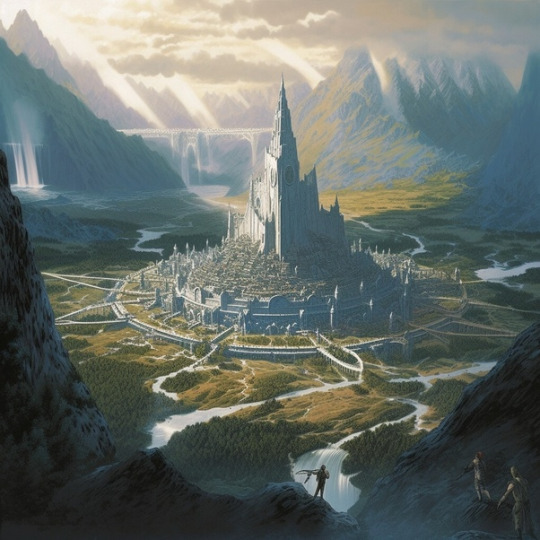
The Hidden City of Gondolin by Aesthetica
Gondonlin is the Elven City (which is why it’s kind of surprising to learn that it’s a copy of an even greater one). It’s gorgeous and bright white, with beautiful fountains and gardens. The giant tower in the middle is Turgon’s palace, and in it he creates images of the Two Trees of Valinor, wrought out of literal silver and gold; the gold one is called Glingal, and the silver one is called Belthil.
The most wondrous treasure of Gondolin is, of course, Turgon’s beautiful daughter Idril Celebrindal. Like Galadriel, she almost has the light of the Gold Tree, Laurelin, in her hair. So, that makes her one of the prettiest Elves alive.
Ulmo promises to protect Gondolin, and ensure that no one will ever be able to find it against his will. But he straight-up tells Turgon not to get too attached to Gondolin. (Actually, he says “the work of thy hands” — lol, Turgon did nothing to help build it.) Ulmo also tells Turgon that his little safe-haven isn’t going to protect him from the Curse, so, he can expect treachery within Gondolin’s walls at some point. The only hope is going to be someone who comes from the west.
What Could Possibly Go Wrong?
A third of the Noldor and even more of the Sindar pass secretly into Gondolin, apparently disappearing overnight. (Nevrast is completely abandoned) Then the gates are shut.
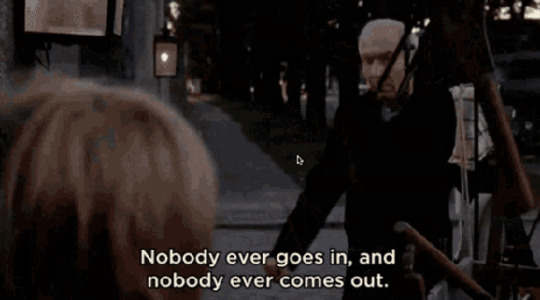
Meanwhile, Galadriel is enjoying her life in the court of Thingol. Remember, she’s one of the only Noldor Elves who’s allowed to be there, past the magic wall. She has long talks with Queen Melian, the Maia, about Valinor. But Galadriel refuses to say anything about how and why the Two Trees died. Melian can tell that something’s wrong, and asks Galadriel what happened. Galadriel says that she wants to put the past behind her, and try to have some hope for the future.
Melian presses her — she knows better than to think, as everyone else does, that the Noldor were sent by the Valar to swoop in and save her people from being assaulted by Orcs. She notes that the Noldor don’t speak of the Valar at all; they just sort of pretend that the Valar don’t exist. From that, she concludes that the Noldor aren’t messengers, they’re exiles. Something went badly wrong.
Galadriel caves, and tells Melian about the Silmarils, about how Morgoth stole them, about the death of Finwë, and about how the Noldor left Valinor willingly despite the Valar not wanting them to leave. She neglects to mention any of the worse stuff, like the Oath that Fëanor’s sons took, or the kinslaying, or the Curse, or the burning of the ships. Melian senses that she’s still holding back information. She doesn’t press Galadriel any more, but she does tell her husband Thingol about the Silmarils.
Only Melian is really able to put two and two together, and realize just what a big-ass deal the Silmarils really are. They contain the last remaining Light of Valinor, and if Morgoth has them, then any attempt at recovering them is almost inherently pointless. It’s going to take far more power than Elves have to take the fight to him. Fëanor tried that, and now he’s dead, even though he was one of the greatest Elves. If anyone else tries to take on Morgoth, they could risk destroying the world in the process. For better or worse, the fate of Arda is tied up with that of the Silmarils.
Thingol is distraught to hear that Finwë is dead, and figures he was right not to trust the Noldor. The only silver lining is that at least the Noldor will make good allies against Morgoth, because peace with him doesn’t seem to be an option. Melian tells him to be wary of Fëanor’s sons. She could read between the lines and figure out what Galadriel wasn’t telling her. Fëanor’s sons are all guilty of crimes against the Valar, their own families, and even themselves. There’s a lot of unresolved tension between them that’s only dormant for the time being, and it can only get worse from here. Thingol dismisses her concerns. All he cares about is that Fëanor’s sons will give him his best shot at taking down Morgoth. Whatever drama is between them is their business.
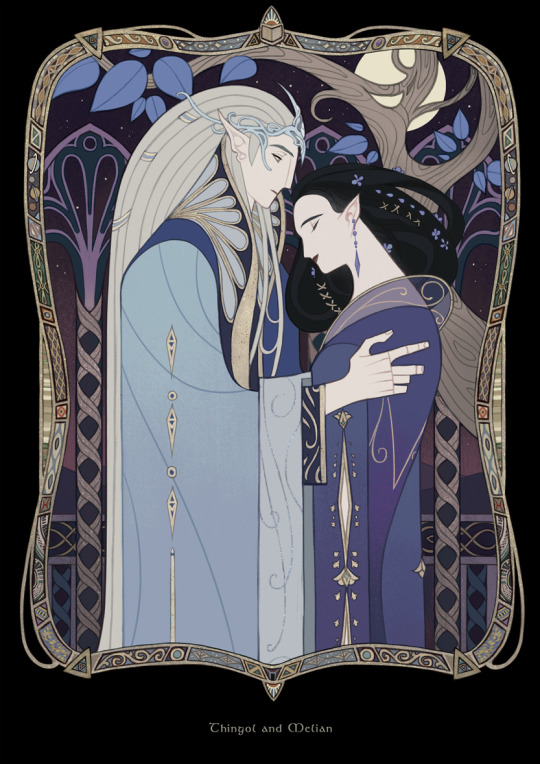
By Wavesheep
Melian and Thingol decide not to speak of this again, but rumor spreads amongst the Sindar about what the Noldor did to get kicked out of Valinor. Many of these rumors are spread by Morgoth. Spreading rumors was how he set the Noldor on their dark path in the first place, and the Sindar were too naïve to know not to believe rumors. Círdan, however, catches wise. He perceives that the rumors are being spread maliciously, but doesn’t think to blame Morgoth. He assumes that the Noldorin princes are spreading rumors to slander each other. He sends messengers to Thingol to tell him about the rumors.
By pure bad luck, Finrod and his brothers happen to be there in Thingol’s court, visiting their sister Galadriel. So, Thingol hears all the rumors while they’re there. He explodes at Finrod for having lied by omission. Finrod protests that he’s never done anything to Thingol, nor have any of the other Noldor. Thingol cooly responds that all the Noldor have blood on their hands for kinslaying, but they don’t try to defend themselves or seek pardon. Finrod has nothing to say to that.
But Angrod, his brother, speaks up. Angrod blames Fëanor for the whole thing. The other Noldor are really the victims in this situation, he claims, because they were intoxicated by Fëanor’s words, and then Fëanor abandoned them to freeze to death. The reason why Thingol hasn’t heard any of this before is because it’s an act of treason against the Noldor to talk about it. Surely, Thingol can understand that?
Melian is less than impressed. She points out that, according to Angrod’s own account, Mandos doomed all the Noldor. That means that he and his siblings are just as damned as the rest of them. They're all affected by the Curse.
Thingol is silent for a moment. Then he tells Angrod and co. to get out of his house. He’s not going to shut them out forever, because they’re family. He’s also going to maintain his friendship with Fingolfin’s people, because he needs them to take down Morgoth. But, he refuses to hear their language be spoken in his presence, and he commands that none of the Sindar use it, either. Anyone who speaks Quenya will be branded a kinslayer.
So, now you know why Sindarin is the dominant Elven language in Middle-earth.
That sort of puts a damper on Quenya; it seems like such a magical and elevated language, but now it’s associated with the Noldor’s crimes. I suppose that makes sense, if the Noldor are the ones who primarily speak it. But it also seems a bit draconian for Thingol to consider someone guilty of a serious crime just for speaking Quenya.
Quenya therefore ceases to be a spoken language, and becomes mainly used for writing lore or singing old songs. It’s the Elvish version of Latin.
After that, things become a little awkward for Galadriel in Thingol’s court, so she leaves it and comes to live with her brother Finrod in Nargothrond. She asks him why he hasn’t taken a wife yet. Finrod gets a flash of premonition, and tells her that nothing of his realm will remain to be inherited by a son. But the real truth is that he left his true love, Amarië, in Valinor.
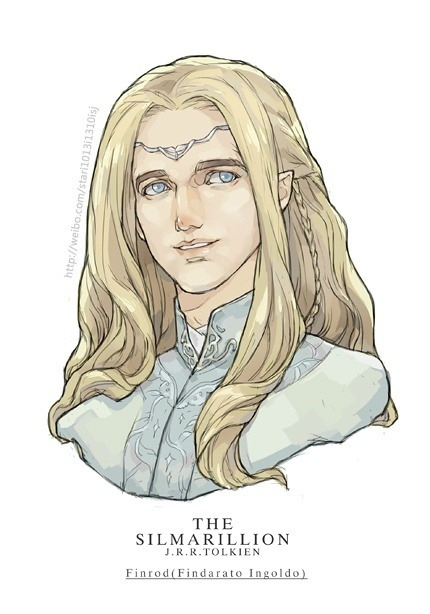
Finrod by _star热爱生活呀巴扎嘿
Chapter 16: Of Maeglin In which we meet an edgy bad-boy Elf.
Did you remember that Fingolfin had a daughter? It’s okay, I didn’t either. Her name is Aredhel Ar-Feiniel, and she’s known as the White Lady. She lives with Turgon, her brother, in Nevrast. She follows him to Gondolin, but she doesn’t really like it there. She prefers to wander freely in forests or ride horses in the fields, and she can’t do that if she’s effectively imprisoned by mountains and high walls on all sides.
Two hundred years pass (which I’m guessing is like twenty in elf years), and she finally asks Turgon if she can leave. Turgon doesn’t want her to leave. If anyone leaves Gondolin, then that risks revealing its existence to everyone else in the world, and that would be bad. Eventually he gives in, but tells her that she’s only allowed to meet with Fingon, their brother. Aredhel takes offense at this. She’s Turgon’s sister, not his lackey, and he has no right to tell her where to go or what to do. She leaves, and Turgon tells three of his lords to go with her to protect her, with the condition that they come straight back.
Aredhel immediately decides not to go see Fingon. She wants to find the sons of Fëanor (Maedhros, Caranthir, and co.), because they’re her friends. She tries to cut through the forest of Doriath, but the Sindar turn her away, because Thingol hates the Noldor now. She has to go around the long way. That way is dangerous, and polluted with poisonous water and evil creatures left behind by Morgoth and Ungoliant. Aredhel gets lost, and her escorts barely escape with their lives. They make it back to Gondolin, but have to give the terrible news to Turgon that they lost their charge along the way.
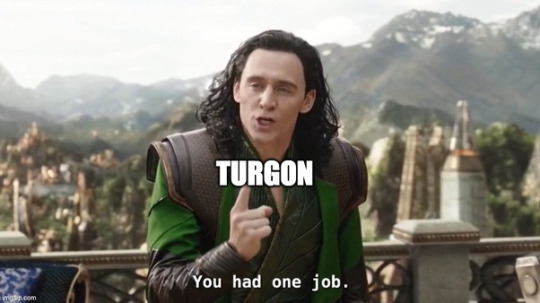
Turgon is grief-stricken and very, very frustrated. Aredhel survives, though, and ends up in Himlad, the land of Fëanor’s sons Celegorm and Curufin. They’re away, traveling further east with their brother Caranthir, but Aredhel is welcomed by Celegorm’s people.
Aredhel enjoys herself for a while, wandering in the forests like she used to, but a year passes and Celegorm still hasn’t come back. She starts wandering further and further, until she ends up in a small forest on the eastern edge of Doriath.
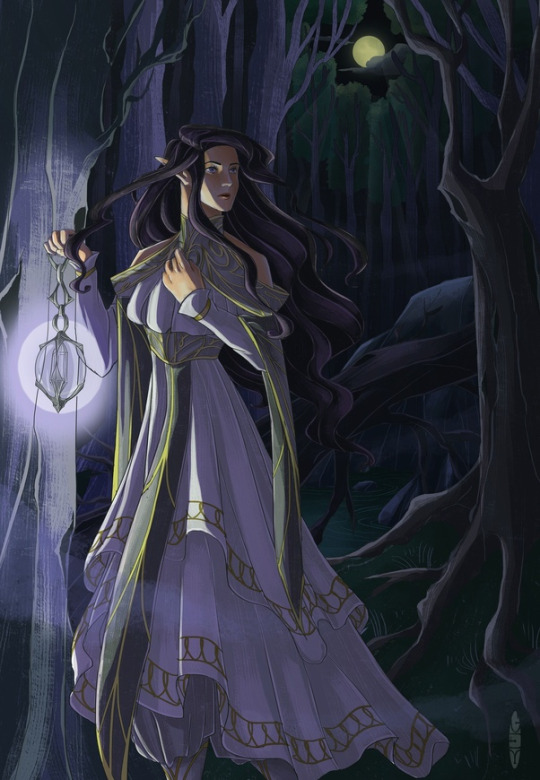
Aredhel lost in the dark forest by @gemennair
This forest is the darkest of all the forests in Beleriand, and it’s inhabited by an elf called Eöl, known as the Dark Elf. Eöl isn’t actually a Dark Elf (Moriquendi); he’s one of the Sindar, but he left Doriath when the magic wall went up. Now he’s basically nocturnal. He blames the Noldor for the return of Morgoth. He mostly doesn’t interact with other Elves, but he does like Dwarves, and gives them information about the Elves when they ask. The Dwarves taught him metalwork in exchange, and he designed a special kind of armor that’s thin and light and yet repels all weapons. It’s jet black, and he wears it all the time.
Skulking in the shadows, Eöl sees Aredhel enter his forest, and he lusts after her. He enchants the forest so that she can’t find her way out, and the forest always turns her towards the center. (Kind of like the Old Forest does to the Hobbits while they’re trying to pass through it in Fellowship.) When she finally arrives at Eöl’s house, tired from wandering, he welcomes her in. And that was the last her family heard of her for a long time.
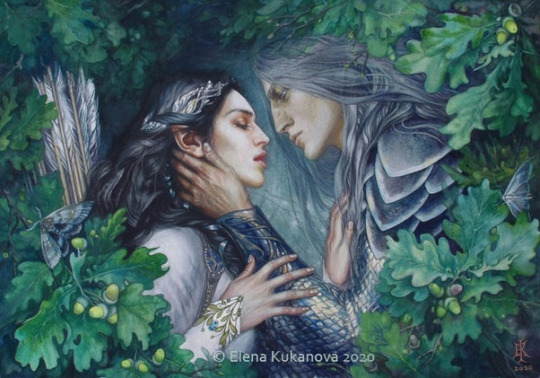
Aredhel and Eöl by Elena Kukanova
It’s unknown exactly how Aredhel responded to Eöl’s intent to marry her. Maybe she fell in love with this edgy bad-boy elf in his spooky forest. But she landed in kind of the same situation that she was in back in Gondolin. Eöl lets her wander, at least, but only at night. He also forbids her from seeking out the other Noldor, and the sons of Fëanor in particular, which is what she wanted to do in the first place. Honestly, their relationship reminds me superficially of Hades and Persephone.
Eöl and Aredhel have a son. Secretly, Aredhel gives him a name in her forbidden native tongue of Quenya — Lómion, which means “Child of the Twilight.” Eöl doesn’t give him a name until he turns twelve, and that name is Maeglin, which means “sharp glance.” Maeglin grows up to resemble the Noldor, but he is more like his father in temperament.
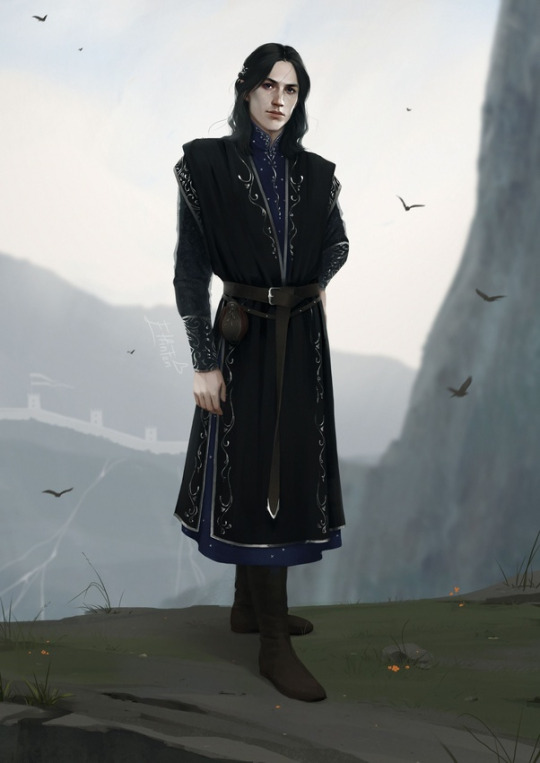
Maeglin by @elfinfen
His father takes him to meet the Dwarves, who teach him mining, smithing, and metalwork. But Maeglin has a special relationship with his mother, and enjoys hearing her tales of Valinor and the House of Fingolfin. He especially likes hearing about Turgon and Gondolin.
In telling all these stories, Aredhel realizes just how much she misses Gondonlin. She wonders how she could have left in the first place. After such a long time in the dark shadows of the forest, the bright walls and fountains of Gondonlin seem lovely. But she refuses to tell Maeglin where Gondolin is, because that is such an important secret.
Eöl is also mad that Maeglin wants to meet his Noldor relatives. He’s an old enough Sinda to still identify himself as a member of the Teleri, and therefore, he thinks of his distant relatives in Valinor as his own people. He forbids Maeglin from seeking out the Noldor for the same reason that King Thingol banned Quenya — he takes the Noldor’s crime of kinslaying personally. (He probably should have thought of that before deciding to marry Aredhel, but whatever.) Maeglin, like any edgy teenager, does not take this well. He stops going to visit the Dwarves with his father, and Eöl starts to distrust his own son.
One summer, when Eöl is gone on one of his visits to the Dwarves, Maeglin suggests to his mother that they go to Gondolin. What’s the point of sticking around? She wants to see her people again, and Maeglin has learned all he can from Eöl. There’s no sense in remaining trapped in a dark forest with nothing else to do. So, they up and leave.
When Eöl gets back, he is furious to find them gone. Despite his hatred of the sun, he chases after them, but he’s waylaid by Curufin, one of Fëanor’s sons. Curufin asks what he’s doing there. Eöl lies, saying that his wife and son were on a casual visit to their relatives, and that it only makes sense that he should be with them. Curufin sees right through him, and tells him that they’re already gone. He gives Eöl permission to pass through, but tells him that the sooner he leaves, the better.
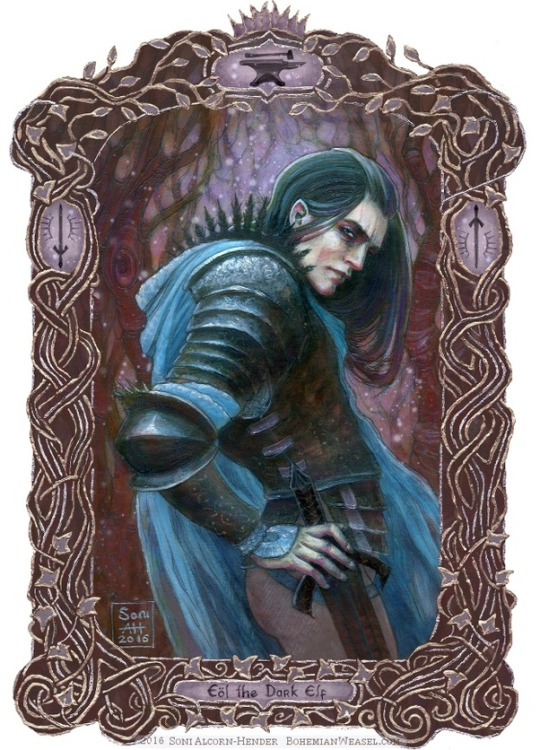
Eöl by @bohemianweasel
Eöl snipes that this isn’t the proper way to treat a kinsman. Curufin replies that it’s pretty rich for Eöl to ride upon his wife’s title when he’s been keeping her imprisoned in a forest for decades. If he wants the honor due to a kinsman, he should have acted like one. Curufin also gives Eöl a warning: He should return to his forest now. If he pursues his family, he’ll never come back.
If Eöl hated the Noldor before, now he really hates the Noldor.
As you probably guessed, he decides to chase after his family, and he eventually catches up with them just as they’re about to enter Gondolin. Gondolin, the secret city that no one is supposed to know the entrance to.
You can imagine how Turgon must have reacted when he sees his sister come back with a son in tow. She went out for a simple family visit, and returned with an adult child that she had with some creepy dude in a dark forest. But he’s happier to have her back and see her safe. Turgon also takes a liking to Maeglin, and thinks that he’s worthy to be one of the Princes of the Noldor. Maeglin swears fealty to Turgon.
Gondolin surpasses Maeglin’s wildest dreams. After having spent nearly his whole life in a dark forest, Gondolin is a whirl of light and color and interesting people. But more than anything else, he’s attracted to the king’s daughter, Idril… his first cousin.
Meanwhile, Eöl finds his way in. You know, the one thing Turgon didn’t want to have happen. Because he claims to be Aredhel’s husband, the guards restrain him (with difficulty) and bring him to Turgon. Aredhel is aghast that her abusive husband followed her all the way to her secret safe haven, but she tells the guards not to kill him. After all, he is telling the truth, and he’s still Maeglin’s father.
Eöl stands “proud and sullen” before Turgon, but despite his bad attitude, Turgon treats him honorably. Unlike Curufin, he accepts Eöl as a kinsman, and tells him that he’s welcome to stay in the city so long as he doesn’t leave it. Eöl goes on a rant about how this is the Tereri’s land, and (paraphrased) “you colonizing kinslayers don’t have any right to tell me where I can and can’t go, and how dare you keep my son from me!” He commands Maeglin to come with him, but Maeglin huffs and says nothing.
Turgon retorts that the only reason why Eöl’s woods are safe is because the Noldor protect the land from Orcs, so, he owes them. If it weren’t for the Noldor, he’d be Morgoth’s slave in Angband. And besides, you can’t argue with a king in his own castle. Either Eöl will live in Gondolin, or he’ll die there, and Maeglin will get the same choice.
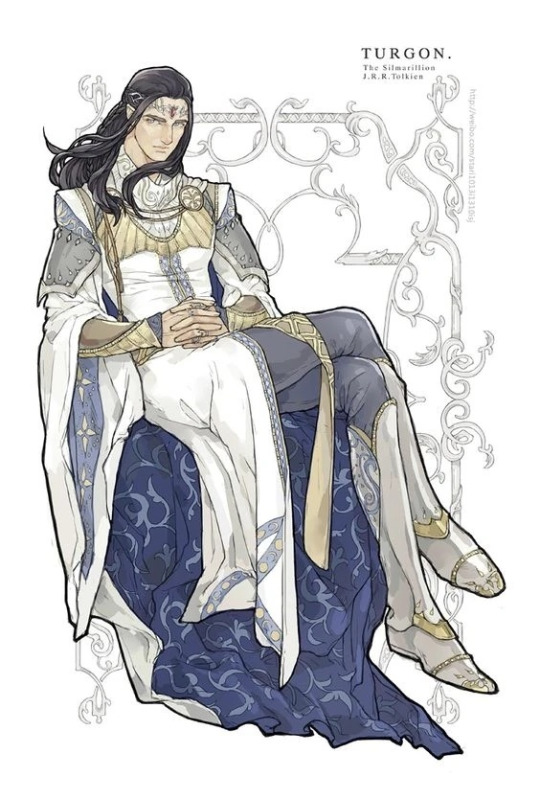
Turgon by _star热爱生活呀巴扎嘿
Eöl just stands silently for several minutes. You could cut the tension with a knife. Then, in a sudden motion, he takes a javelin that he had concealed in his cloak and throws it straight at Maeglin. If he’s gonna die there, he’s taking Maeglin with him. Aredhel jumps in front of her son, and the javelin hits her in the shoulder.
Eöl is instantly beset by guards, who bind him and lead him away. Maeglin is just silent through all this, not knowing how to react. Aredhel and Idril both try to convince Turgon to be merciful during Eöl’s trial, but that night, Aredhel dies. The tip of the javelin was poisoned. Therefore, Turgon shows Eöl no mercy. He sentences him to die by being thrown from the top of the tower. As he falls, he curses Maeglin to have all his efforts fail and to suffer the same fate.
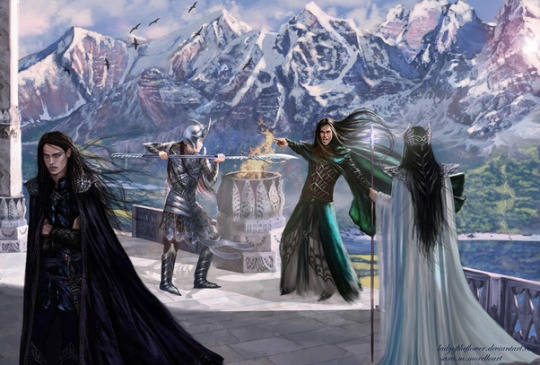
Caragdur - the same fate by SaMo-art
Most of the people of Gondolin believe justice has been served, but Idril is troubled. From that day onward, she distrusts Maeglin.
For the time being, Maeglin’s life is good. He rises through the ranks of Turgon’s court, and Turgon favors him. He finds many valuable metals in the mountains around Gondolin, and forges powerful steel weapons for the people of Gondolin. Maeglin is also wise, tough, and valiant in battle, making him a true asset to Gondolin. All is well… for now.
The only problem is that he’s still in love with Idril, who’s his first cousin. The Noldor don’t marry their cousins, and until now, none of them have wanted to. Idril also doesn’t love him; she can’t help but associate him with his insane father, and she thinks there’s a darkness in him. Somehow, he’s affected by the Curse. Slowly, Maeglin’s love for Idril festers into resentment. I’m sure that won’t cause any problems down the line.
Chapter 17: Of the Coming of Men into the West In which the Men finally arrive in Beleriand.
It’s been three hundred years since the Noldor first arrived in Beleriand. One day, Finrod Felagund is out exploring the countryside, and he sees cheery campfires and hears the sound of singing. That’s weird, he thinks, the Green Elves who live here don’t light campfires or sing at night. He worries that they might be Orcs, and sneaks closer, but he doesn’t recognize their language. They’re humans, the first Men to enter Beleriand. These Men are the people of Bëor the Old, and they’re singing because they believe that they’ve finally found a paradisal land without fear of Morgoth. Finrod finds them endearing.
When they go to sleep, Finrod sneaks further into their camp, picks up a crudely-carven harp, and begins to play. The Men wake up and are spellbound by the beauty of the faerie king’s music. Finrod sings about the creation of the world, and about Valinor. Although the Men don’t understand his language, images of what he’s singing appear in their minds, and so they learn about how the world was created.
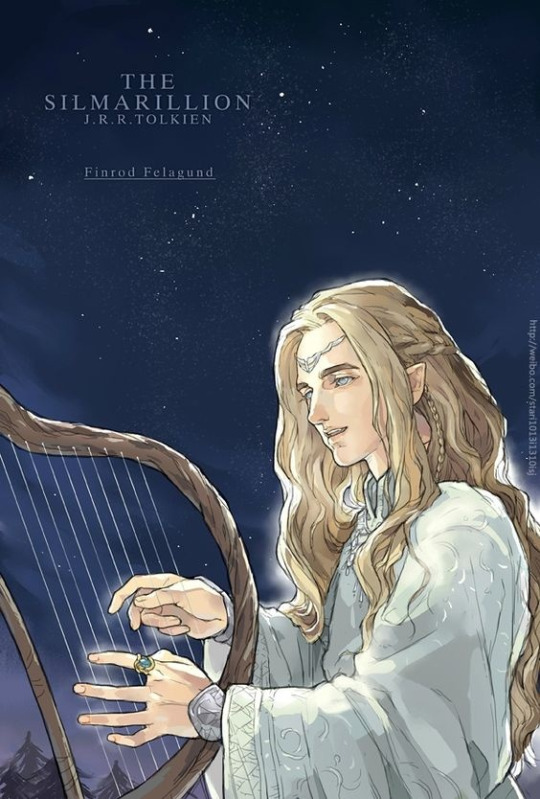
By _star热爱生活呀巴扎嘿
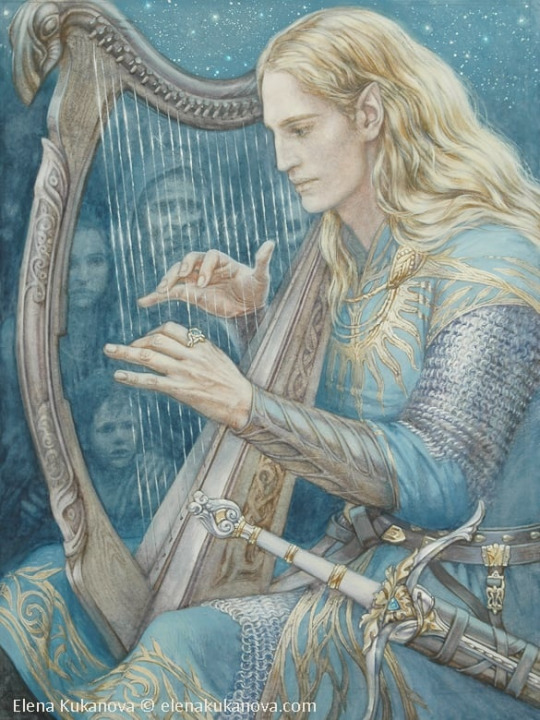
By Elena Kukanova
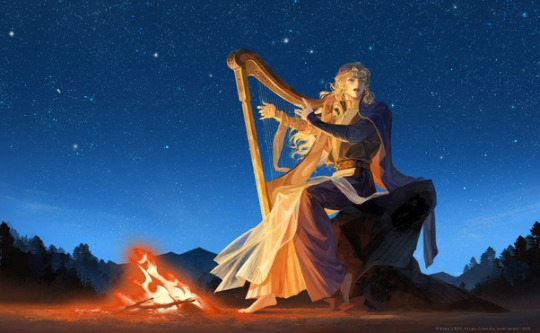
By pan_brooke
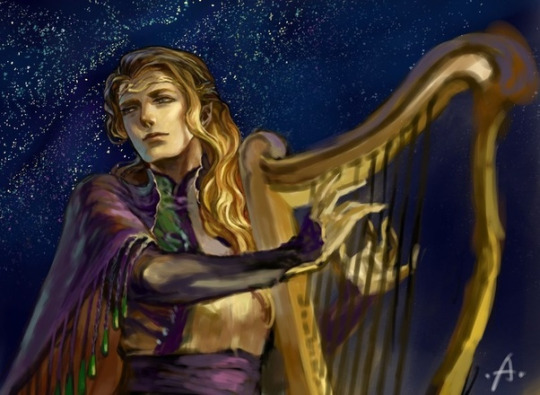
By @pansen1802
(I couldn’t pick just one image for this scene. There are so many good ones!)
After all the Elf Drama that we’ve had to sit through, it’s easy to forget what the Elves really are. They’re the Fair Folk. This scene really speaks to their folkloric roots.
At first, the Men think that Finrod is a Vala, which they’ve heard of. Finrod decides to stay with the Men for some time, in order to teach them things. They call him Nómin, which in their language means “the Wise.” Finrod can understand the Men’s speech realtively easily, because he can read their minds, and because they learned how to speak from the Dark Elves (the Avari) in the east. (This is important because it means that all of the Children of Ilúvatar’s languages descend from the original language of the Elves. It’s the Proto-Indo-European of Middle-earth.)
Finrod asks Bëor why the Men are there. Bëor doesn’t really know, because Men have short lives, and it’s taken many generations for them to get this far. Whatever it was they were fleeing in the first place, it was bad, and they’ve heard enough about Valinor to know that there’s Light in the west. Morgoth did something to corrupt them, as he always does. In fact, as soon as Men arrived in Middle-earth, Morgoth considered this such a big deal that he abandoned the war in Beleriand, putting Sauron in charge of it. Morgoth immediately went to go mess with the Men. Therefore, there’s some human equivalent of the Noldor’s Original Sin of kinslaying. But what it is, no one knows. Bëor tells Finrod that there are more Men heading westwards.
Some of the Green Elves send messengers to Finrod to ask about the Men. They’re not happy that these refugees of an unknown race are moving onto their land. They consider Men their enemies, because the Men cut down trees and kill animals. They tell Finrod to tell the Men to either go back the way they came, or move forward.
Finrod advises the Men to keep moving. They head further West, so that they’re just east of Doriath and just south of Eöl’s dark forest. This is the land that Amrod and Amras, the twin sons of Fëanor, rule over. This land is now called Estolad, “Encampment.” By that point, a year has passed since Finrod first found the Men, and he decides to return home to his own palace, Nargothrond. Bëor begs to come with him and serve him, so he does, leaving his son in charge of the Men.
Soon after, more groups of Men make their way into Beleriand. They settle in whatever little niches they can find amongst the lands that the Elves had divided up amongst themselves. The Elves are extremely interested in the Men, whom they call Edain, “the Second People.” Both Noldor and Sindar alike go to see them. They send messengers to welcome the Men, and some of the Men go to serve in the courts of the Elven kings. Overtime, more and more of them go to serve the Elves.
Thingol, however, is unhappy about the coming of Men. He already was not pleased about the arrival of the Noldor in his lands, even before he found out that they were kinslayers and banned their language. Now, a whole separate group of refugees is invading his kingdom from the other direction, dividing it into even smaller portions. What’s worse, he keeps having troubling dreams about them. The only person he’s willing to talk to about this is Finrod. Thingol decrees that the Men are only allowed to live in the north of Beleriand, and that the Elf lords that they serve are responsible for them. None of the Men are allowed to come into Doriath.
Melian knows that the arrival of Men means that big changes are coming. She whispers to Galadriel that one of the Men will eventually break through her magic wall, because the power of that Man’s destiny will overcome her own. People will sing about that event until the distant future, when Middle-earth is unrecognizable.
Many of the Men are still interested in getting to Valinor, so they can live with the Gods. They’re frustrated and disappointed to know that Valinor is even further west, across the sea. The only God that’s there with them is Morgoth, the Lord of the Dark. (This echoes the Christian idea that God is removed from the world, while Satan is here on earth with us and troubles us while we’re alive.) The Men basically have two options: to try to get across the sea to Valinor, or to try to help the Elves defeat Morgoth.
One Man, Amlach, makes the bold suggestion that there is no Valinor, and that the Elves have been lying to them. The Men have no proof that the Gods exist, and they don’t even have any proof that Morgoth exists beyond the vague evil that their great-grandfathers fled. Maybe it’s the Elves and not Morgoth who want to take over the world! Sound familiar? These are basically all the same conspiracy theories that drove the Noldor out of Valinor.
It’s darkly telling that the source of evil in The Silmarillion is conspiracy theories, lies, misunderstandings, and miscommunications. Morgoth didn’t force the Noldor to kill their relatives — they did that on their own. Now, he’s trying the same tactic all over again with the Men. All he needs to do is sew distrust amongst the people, so that they’ll attack each other instead of him, and destroy everything in the process. This speaks to Tolkien’s general theme about the power of language, but it also seems particularly poignant right now.
Morgoth’s not done yet, though. Despite his best efforts to sew distrust, the friendship between Elves and Men still holds. He decides to try a more direct approach, and sends Orcs to attack a group of Men. The Men are a lot weaker against the Orcs than the Elves are, and they barely survive the siege. Caranthir arrives with the cavalry at the last minute to drive back the Orcs. Caranthir offers the Men protection in his lands in the north. Their leader, Haleth, refuses; she doesn’t want to live under someone else’s rule. She tells Caranthir that she’d rather go further west. She gathers what’s left of her people, and brings them to Estolad.
Haleth leads her people further and further west. They travel through the land north of Doriath, the same poisonous land where Aredhel originally got lost. Many of her people die, and the survivors regret making the journey, but it’s too late to go back now. She tries to restore their way of life best she can.
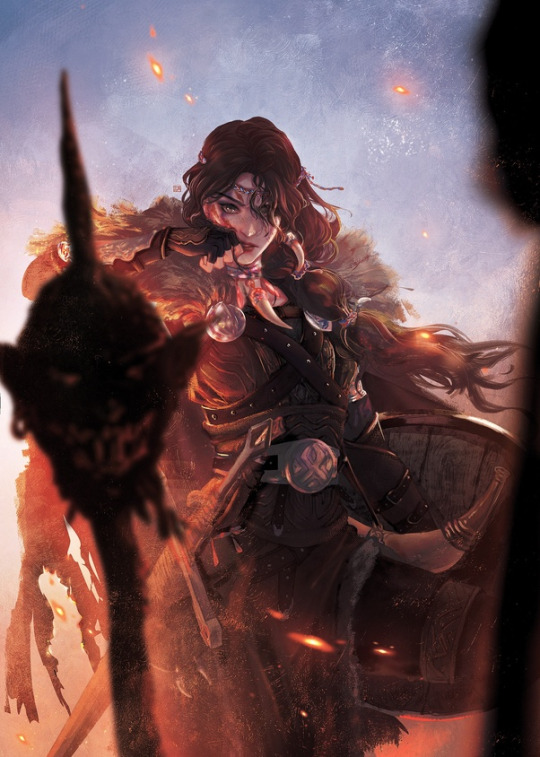
Haleth by @yidanyuan
Now, Haleth and her people are living in a forest called Brethil, northwest of Doriath. This is too close for Thingol’s comfort. Finrod vouches for Haleth and her people, and tells Thingol about the hell that they went through. Thingol reluctantly permits them to live in the forest, so long as they remain outside the magic wall and help defend the forest from Orcs. He worries that the Men and Orcs could become allies and try to attack Doriath. Haleth is disturbed that Thingol would let that thought cross his mind; why would she ally herself with Orcs, after Orcs laid siege to her village and killed her father and brother? If Thingol wants her to kill Orcs, he doesn’t need to tell her twice. She remains in Brethil until she dies, at which point her people build a great barrow for her.
Overtime, the Men learn Sindarin. They remain enthralled by the Elves, and want to learn as much of their lore as possible. But the Elves recognize that Men need to have kingdoms and leaders of their own. The different ethnic groups of Men are therefore given their own lands by the Elven Kings. In addition to Haleth and her people, there are two other important kings of Men:
One of the kings of Men is Hador Lórindol (“Goldenhead”), a member of Fingolfin’s court, whom Fingolfin is fond of. Hador’s people speak both Sindarin and their own language, which eventually evolves into the language of Númenor (which in turn evolves into Westron, the in-universe language that The Lord of the Rings and The Hobbit are written in, rendered as Modern English by our good Professor Tolkien). One of Hador’s sons is named Galdor. Galdor has two sons, Hurin and Huor. They each have a son — Húrin’s son is Túrin, and Huor’s son is Tuor. Tuor has a son, Earendil, whose name should ring a bell. Húrin, Huor, Túrin, and Tuor are all going to be important characters going forward in The Silmarillion. Earendil is the father of Elrond and his brother Elros, and much further down the line, Aragorn will be born from his lineage.
The other important king of Men is Boromir — no, not that one, this one is the son of Bëor the Old. One of his great-great-grandchildren is Morwen, the mother of Túrin, and another one of his great-great-grandchildren is Rían, the mother of Tuor. A third great-great-grandchild is Beren, who’s also a significant character going forward, and his daughter becomes the wife of Earendil, therefore the many-times-great-grandmother of Aragorn.
TL;DR: These two important kings’ grandchildren will marry each other, and their descendants will be the Kings of Numenor, whose line will eventually end with Aragorn. This is where it starts. Also, most of these great-grandchildren are about to become relevant here in the Silm.
Bëor is the first of the Men to die of old age, rather than being killed in battle. The Men are struck by their own mortality. They’re not just vulnerable to being killed — unlike the Elves, they actually have an expiration date. The scope of Men’s lives is barely a hundred years. In the First Age, the Men are practically mayflies. They also have no idea where they go when they die.
Still, the Men that settled in Beleriand are vastly superior to the Men that remained in the East, because they had the opportunity to learn skills, lore, and craftsmanship from the Elves. Also, the men are elevated somewhat just from having seen the Elves’ beautiful faces, because the Elves saw Valinor. Even secondhand, the light of Valinor is just that powerful.
#the silmarillion#the silm#the silm fandom#the silm art#silmarillion#summary#j r r tolkien#the lord of the rings#lotr#finrod#finrod felagund#eol#maeglin#haleth#curufin#celegorm#turgon#aredhel#tolkien#middle earth#elves#tolkien elves#silm elves#beleriand
28 notes
·
View notes
Text
I’ve said before that I find Denethor and Ecthelion’s relationship strange. Denethor is clearly very competent, very dutiful and very Númenorian. You’d think he’d be seen as the perfect heir to the Stewardship, and yet his relationship with Ecthelion seems abysmal. Ecthelion prefers Thorongil over him, despite them giving him basically the same counsel.
I think I’ve managed to wrangle a set of headcanons that make sense to me. Most of this is speculation, but hopefully in character.
Denethor saw himself as being destined to lead Gondor during a time of great need, and Sauron’s return to Mordor happens when he is in his early 20s. Turgon still lived, with Ecthelion as his heir. Denethor’s power and cunning were presumably obvious from a young age. Perhaps by this point he was already better thought of than Ecthelion by some.
Ecthelion seems to have been a competent leader, and certainly no fool. The appendices call him “a man of wisdom”, but this seems a far cry from Denethor’s description:
“a proud man, tall, valiant, and more kingly than any man that had arisen in Gondor for many lives of men; and he was wise also, and far-sighted, and learned in lore.”
“A masterful lord, holding the rule of all things in his own hand.”
In this context, Ecthelion almost seems to be being damned with faint praise. Denethor was dutiful and did not take that which he did not see as his right. He made no claim on the throne. His use of the Palantir however shows great self-confidence, which along with his belief of being destined to lead Gondor and the old Húrinionath tradition of being led not by the most senior but most competent man of their family may have led to strife with Ecthelion.
I think shortly after Turgon’s death Denethor made Ecthelion an offer, to make Denethor joint or sole regent to rid himself of the troubles of ruling, similar to Romendacil II with his father and uncle. Ecthelion took this (understandably but wrongly) as Denethor threatening him and plotting a coup. This shatters their relationship and leads to Ecthelion’s close relationship with ‘Thorongil’. He’s the perfect answer to Denethor, removes any need for dependence on his son and is undoubtedly loyal (while also serving as a surrogate son). Thorongil is a perfect shield for Ecthelion, and Denethor’s rivalry with him keeps Ecthelion’s position safe.
This holds until Ecthelion begins to show his age. Unable to rule anymore, he’s forced to concede more power to Denethor, who now starts to take up the regency. Aragorn is backed into a corner in this potential powder keg and decides to take his victory at Umbar and quit while he’s ahead.
This also neatly parallels Denethor's own relationship with Faramir. Ecthelion believes Denethor is disloyal because his duty to Gondor outweighs his duty to his father. Denethor in turn sees Faramir as disloyal because his duty to his own moral code outweighs his duty both to his father and his country.
#denethor ii#ecthelion ii#aragorn#húrinionath#lotr#i think denethor would be sincere but misguided in this#he sees ecthelion's heart is troubled by sauron and tries to offer him a noble way out#or at least to share that burden#while taking up what he sees as his destiny#but it just ends up making everything worse
19 notes
·
View notes
Note
Do you have a scene you really liked but weren't able to fit it in a fic? Would you care to share? Do you have a most recent favorite line or scene? What is it?
*Asks are sent for fun, no pressure to answer.
I'm one of the writers who start up tons of stories at the same time and never finish any of them, so, more than scenes I weren't able to fit, what saddens me is that some of my stories had really nice moments in them, that were actually written, but because I could never finish the fic or even finish some part of it that could be shared with other people, they sort of just stay in my docs, haunting me. There are two post-mountain break-up geraskier fics I was writing a long time ago that I feel particularly sorry I never continued. Neither was very long (one had 8k and the other only over 3k words), but I really liked the premise of both and I wanted them to become real stories, but they were both building up to be long fics and I had other stuff to write at the time as well and by now I haven't even looked at them for two years. The longer fic saddens me more and I still like to think that I haven't completely abandoned it, but the hope is minuscule these days.
With scenes that I had in mind at some point and I didn't manage to put them in... usually, I just like the alternative which turns into the final product much more and so I don't mourn them so much. I don't think if I can think of a single example right now, which, considering what I wrote in the previous paragraph, is kind of a relief haha.
As for recent lines, well, I have been having a bit of a hard time writing lately, so they are not recent per se, but they are the most recent ones I actually like? If it makes sense? They are more like passages, though, so that's why they are a bit longer:
(unpublished) Ch4 of my royjamie amnesia fic:
“Fine, let me rephrase that. I want you to tag along.” Jamie snorted and his eyes glowed with mischief. “Wouldn’t say no to helping an invalid. My mum raised me better than that.” “Oi!” Roy said, far more loudly than the non-existent distance between them warranted. “Fuck, man,” Jamie said after a grimace and Roy laughed and Jamie shook his head and kissed him, not stopping for a peck or a breath of air. He licked his way straight to Roy’s brain and Roy felt him absolutely everywhere and nowhere at once. Never in his life had he imagined that kissing Jamie Tartt could feel like this and that he would ever get to feel it. His hands tightened around where he was holding onto Jamie’s hoodie as he felt them go forward. He had no idea whether he was pulling or Jamie was leaning forward of his own accord but now he was lying on the grass and Jamie’s hands were on his waist and none of it rang any bell, but it still rang true. So much so that he’d almost forgotten where they were in the first place.
The (also unpublished) continuation of my Éomer/Faramir post ROTK fic:
Because he needed the solitude, needed to feel the cold air on his face instead of the warmth of the hall that felt almost scorching when it had Faramir orbiting inside and saying all the things Éomer had heard numerous times and still had no intention to heed. But were this the only hardship he’d had to face, he wouldn’t have lost his nerve. He hadn’t lost it with Elfhelm even though he had to face Elfhelm's opinions on this matter almost daily, and he hadn’t lost it once when Aragorn kept insisting that the Mark had only to call for aid and Gondor would answer. His blood wouldn’t boil the way it did now, and his instincts wouldn’t be so akin to fleeing.
They are both pretty out of context, but I really like them and I really hope they get to stay in my final versions of these stories. Otherwise, they would be the ones, I would actually mourn lol.
Thank you so much for the ask! I wish you an amazing day!
#ask box#answered asks#ask me anything#geraskier#royjamie#faramer#éomir#I never know which tag is better for them#I'm always happy to talk about my unfinished projects despite the haunting part
5 notes
·
View notes
Text
My thoughts on Rings of Power Episodes 4 and 5 before I watch Episode 6
Episode 4
Overall episode 4 is definitely a filler episode or b storyline episode and I’m fine with that. Sometimes, as a writer, you accept that that one chapter isn’t as strong as the rest. That being said I wonder if the scenes that make up this episode might have felt better pacing wise if worked into other episodes instead of cramming the filler all in one episode?
That being said, I love the developing relationship between Isildur and Arondir. I know Arondir has to die sometime between now and the end of the series because otherwise Isildur would have destroyed the one ring.
I also love Isildur’s developing arc where he seems to become a spokesperson for the southlanders to Numenor whenever he returns. I imagine both Elendil and Miriel and the rest of Numenor want nothing more to do with the southlands and I can see Isildur campaigning their cause, similar to how Boromir campaigns Gondor’s cause to Aragorn: “yes there is frailty in men but there is also strength and courage.”
Estrid as a character herself is meh, but what she represents is really interesting in context of the bigger story. You can’t expect everyone to be suicidally brave all the time. People want to survive. To paraphrase another franchise, “Just because someone stumbles and loses their path, doesn't mean they're lost forever.”
Oooh Isildur you’re such a disaster. Only you would stumble upon the bog of eternal stench
“We shall call this lunch.” XD
Rory Kinnear! As someone who is not a huge Tom Bombadil fan (don’t kick me out of the fandom), I was more excited that Rory Kinnear was in this show than the character he was playing. That being said, I liked his portrayal of Tom especially the mind games “Is anyone else with here with you?” “You’re here, right? At least I think you are.”
Also, I didn’t mention this last time, but the whole “no one can give you a name, it finds you” bit is so trans coded.
Also, Gandalf you have like ten million names, so don’t start XD
And I would die for that lamb, Iawain I think their name is.
Stoors! Future Hobbiton!
HOLY SHIT ENTWIVES!!!! The Ents have always been my favorite part of the Lord of the Rings universe and to see an Entwife! I want to cry!
I would die for Winterbloom. She can do and has done no wrong. I support her murderous rampage against all tree enemies
That scene with Arondir and Winterbloom: forgiveness takes an age. It had me near tears. And “do you think they know peace?” It was so beautiful and gentle and so Tolkienesque. It was absolutely perfect.
I’m really curious how Theo’s storyline is going to develop. I can see him becoming one of Isildur’s trusted knights. Season 1 I was convinced he’d end up as a nazgul, but this season I’m not so sure.
The bickering between Galadriel and Elrond was fun, but also put aside your pride and be friends again! You need each other!
Poor Elrond feeling responsible for Brimby’ fate ☹
The barrow wrights were fun. It was cute that this was basically everything Peter Jackson cut out of the first half of Fellowship minus Glorfindel.
I swear Elrond’s hair grows poofier the more stressed he is
“According to lore…” Elrond, you big nerd
Not enough Adar this episode.
Episode 5:
Dwarves!
Argh, Durin III you drive me crazy. I want to like you but also you are a stubborn ass
Love the whispers that occur when Durin III takes one of the rings.
Also love that the dwarven ring is like crack for Durin III. Let me make a huge hole in the foundational way, let me introduce a new tax system, alienate all my allies by demanding half of their wealth in exchange for these awesome rings, and forgive my son while discounting his wife’s opinions all in one day
Also love the sheer terror in Durin IV and Narvi’s faces as Durin III almost brings down a foundational wall XD
And those dwarf miners are so me. Get to go home early? Don’t have to tell me twice
And that’s going to come back and bit them in the ass right? You can’t just weaken a foundational wall and expect nothing bad to happen, right? (I know nothing of construction, but I feel like that’s a bad idea)
That Khazad……DUM was pretty awesome
I love this idea of the resonating being a gift from Aule, a skill that has been passed down generations and is this time honored traditional that belongs to the dwarves and then these rings come in and try to replicate that power but whereas resonating is having a conversation with the mountain, the ring just pierces through the mountain and sees what the wear wants to see. It’s an interesting commentary on how outsider will try to appropriate indigenous skills without truly understanding its purpose or how it works or how it helps maintain balance within the ecosystem
Also can I say one more time for those who missed it DISA IS MY QUEEN AND GODDESS. I WILL DIE FOR HER
Sauron is soooooo done with this gathering it’s hilarious. He is me during any and every work meeting
Ah Brimby and Narvi having a moment together. So sweet
DOORS OF DURIN BABY!!!!
Guarded by a password known only to “friends”. Eh, eh, get it? Haha
So I know Sauron really left because he doesn’t care about the doors, but I also choose to believe he left because he was jealous of the banter between Celebrimbor and Narvi XD
Oooh this balcony scene is painful because of the levels of gaslighting.
“You don’t always listen. Once you have an idea set in your head” – god I’ve heard things similar to that so many times from my own abusers.
“It is a game you play, is it not? Sowing seeds in others’ minds and then convincing them that the fruit is of their own thought.” - Brimby is starting to get it, but too late. :(
Also I love that Celebrimbor is so fond and protective of his dwarf friends. “this is a night for dwarves” and then later when Sauron tries to cast doubt on Durin III’s character, Brimby says such a strong NO! So different from the relationship between dwarves and Elves in the third age, when an Elf would probably be more likely ot distrust Durin III instead of the rings themselves.
Celebrimbor may be a dwarf man but he does NOT like men (the race, not the gender haha)
Also love how queer the relationship between Celebrimbor and Annatar is. As much as I’d love to see an official queer couple in LOTR world, I also love how often Patrick and Payne queer-code things. They seem really open to the idea of queerness in Tolkien, so maybe we’ll see a queer couple some day?
Nine rings?! Yeah, it does seem like a lot, right? I thought so when I first read the poem XD
“Fine, I’ll do it myself” poutness activated!
Also, Brimby, dear, when did you lose control over your own forge? Do you even know how that happened?
Fucking Pharazon and Kemen. Hope a sea monster eats the both of you
Also Pharazon makes the most demented grandpa/santa claus face right before ruining his son’s life
Seriously who tells their son, “hey, did you know your mother said you were going to die horribly” while breast feeding you that one time? Like WTF? Would have felt bad for Kemen IF THE REST OF THIS EPISODE DIDN’T HAPPEN
Elendil, darling, what are you doing in the queen’s bedchamber in the middle of the night?
Also, I’m not usually a shipper, but every time Elendil and Miriel are in a scene together I’m like:
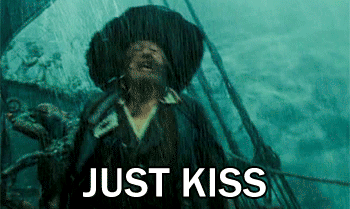
Also poor Miriel trying so hard to do what is right. Terrified to do anything that could jeopardize her people’s future
The chest touching, the arm grabbing, the hand touching. You two are soooo in love, you dorks
Fucking Kemen and Earien
I LOVE that Elendil spends this entire scene thinking, “can punch the kid. Think of what Miriel said. Really want to punch this kid. No, no. Keep calm, keep calm.” XD
Ok Earien and Elendil need some family counseling. They’re both grieving and so they’re lashing out but also “and yet overthrowing a queen earned you a promotion” and “you’re path is made of seawater” is soooooo cold, Elendil
I’m annoyed with Earien but I understand her and I feel bad for her. She’s truly alone because her Dad and oldest friend don’t do feelings and her brother is dead and the other one is Eru Iluvatar knows where. (also is anyone going to tell Anarion that Isildur is “dead”?)
But seriously, Earien, you can do better than Kemen
Gil-Galad’s vision!!!
Run, Elrond, run!
Edna Mode: No capes!
Disa! Disa! Disa, just let the rock go! It’s not worth it! You’re going to give me a heart attack!
Nothing bad can happen to Disa, you hear me Patrick and JD?
The Watcher? It has to be the Watcher right? I can’t see the Balrog hanging around a pool of water
Just thinking about Arondir’s relationship with the tree he had to cut down in season 1 and his conversation with Winterbloom and Disa’s personal relationship with the mountain and the importance of respecting your own environment and ecosystem
Also, it’s tragic how these rings bring so much hope to those who receive them/make them and we all know what they will truly wrought. The downfall of so many people/kingdoms
“Who set these restricts?!” Haven’t we all been there? We made rules ages ago and then we’re like wait who’s the mook who made these rules up? XD
Love the small panic about misplacing the ring and its heaviness
Durin IV will put up with a lot old man, but don’t you dare disagree with Disa! She is ALWAYS right
When will people LISTEN to Durin IV!!! FFS
Celebrimbor’s little anvil paperweight is so cute :3
Do you think Sauron was insulted when Mirdania called him stinky? XD
Also, I like the hint that even though Celebrimbor is “old” looking, he’s still got quick reflexes and prowess as he dodges and counters Mirdania’s attacks.
Also, that look on Celebrimbor’s face when Mirdania explains what they were doing. I think he is taken aback not just because of what they did but also because, potentially, that is something Annatar should have known was dangerous and how to counter the negative effects. They’ve made ten rings together already. Surely Annatar of all people should know how volatile and fussy mithril can be.
Also fucking Annatar being all, “we could really use your help” *puppy dog eyes*
Seriously WHEN WILL PEOPLE LISTEN TO DURIN IV
Also love that other people just call him Durin the younger XD
Sauron just doesn’t know how to flirt, does he? Let me compare you to my ex-girlfriend. That will win you over, right? Also, your boss is secretly that flaming, stinky thing you saw. Just trust me on this
“Meet again in a far green country under a sweet sunrise” *cries*
Elendil puts a clam for Isildur and it ends up being for Valandil *cries*
FUCKING KEMEN, YOU LITTLE SHIT!
“It’s in the way of the new aqueduct” Ok, that line reading made me laugh
HOW DARE YOU DESTROY THAT RELIC!! KEMEN YOU LITTLE SHIT
Elendil FINALLY punching the little shit
“May the Valar forgive me.”
Meanwhile the Valar are eating their popcorn and chanting: “punch the little shit. Punch the little shit.”
“Put it down, son” *cries*
VALANDIL NO!!!! KEMEN YOU LITTLE SHIT!!!
The washing away of the blood – just KEMEN YOU FUCKING PIECE OF SHIT!!!
So Isildur’s eventual return to Numenor is going to be realllllllllly awkward
“Just be mindful someone is not manipulating you” Sauron, you little shit
Poor Brimby, so terrified of questioning Annatar, but having to do it for his dwarf friends
And then Annatar’s all like, “While you lied, so it’s your fault.” Such a little shit
I really feel like Celebrimbor wants to say, “But I lie to my cousin all the time. It’s what family does, after all haha.”
I also love that Annatar’s like, well the dwarven rings were made under a cloak of deception and that’s bad, so let’s just finish the nine since we’re in hell anyway and Brimby’s just like, “Yes, the trauma and depression agrees with you.”
Poor Durin and Disa. They just want to do what’s right for their people and their king. :(
Also that need flourish to the dwarven theme kicks ass. Well down Bear McCreary
Poor Brimby. Lashing out at his artists because he can’t come out and admit what he did and all that guilt and shame eating him from the inside out. He needs Durin IV to move in with him and call bullshit whenever Annatar speaks
“The nine must redeem us all” *Cries* You did nothing wrong, Brimby, except trust a random man who did an impressive lightshow and called himself a messenger from the gods. Yeah…that wasn’t your best moment haha
And then the trembling hands because he knows something is wrong, he just can’t figure it out and he knows he’s to blame but he can’t understand why. *cries*
Charles Edwards is going to break me in the next few episodes as we get closer to the end.
I love how Gil-Galad is like we can’t defeat both Sauron’s and Adar’s armies and that’s it. End of scene. It’s like, do you have a plan? Are you going to do anything besides look pretty and depressed?
Adar! Adar! Adar!
Why does Adar look so turned on by Galadriel holding a knife to his neck? XD
3 notes
·
View notes
